Leadership and Management Concept : assignment
VerifiedAdded on 2021/02/20
|17
|5428
|52
AI Summary
Contribute Materials
Your contribution can guide someone’s learning journey. Share your
documents today.
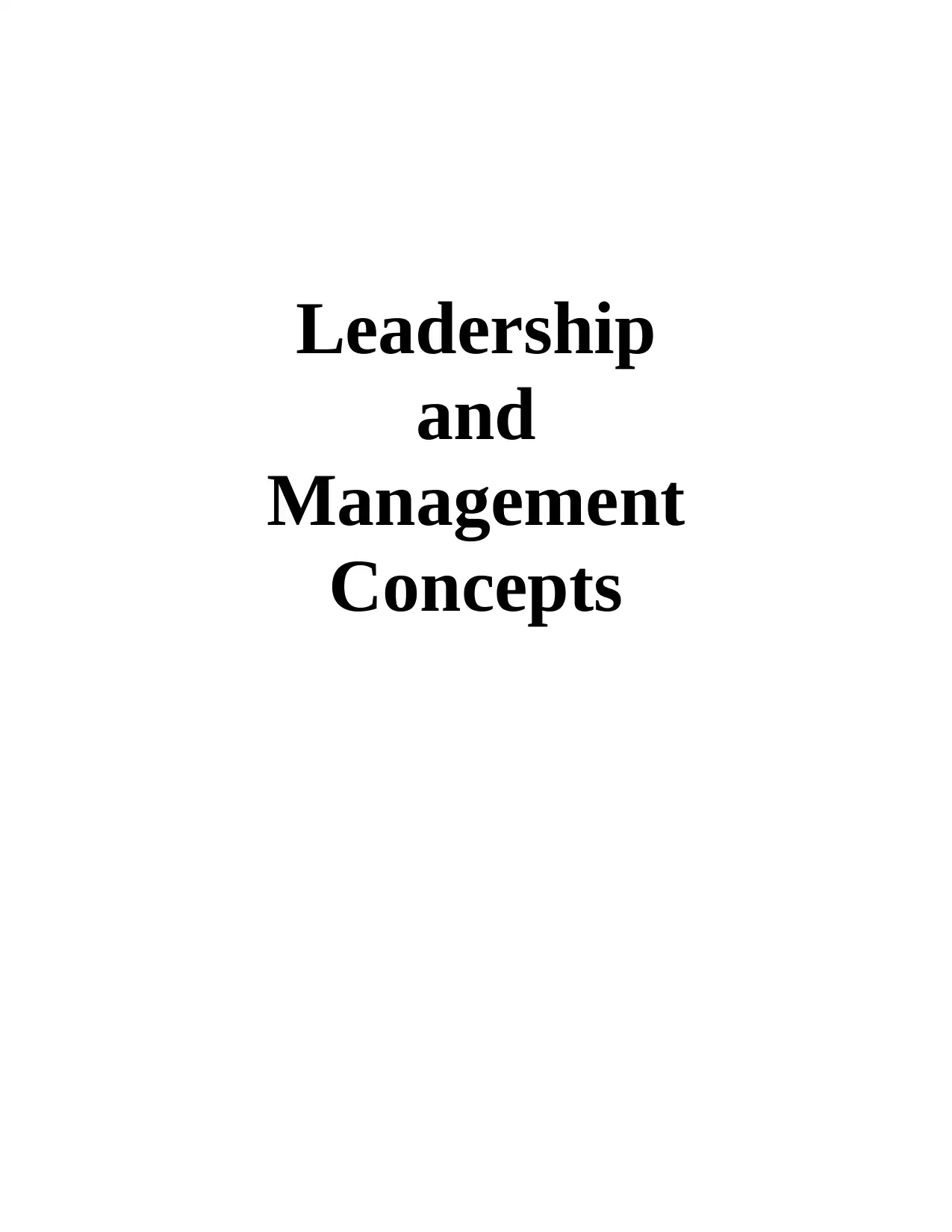
Leadership
and
Management
Concepts
and
Management
Concepts
Secure Best Marks with AI Grader
Need help grading? Try our AI Grader for instant feedback on your assignments.
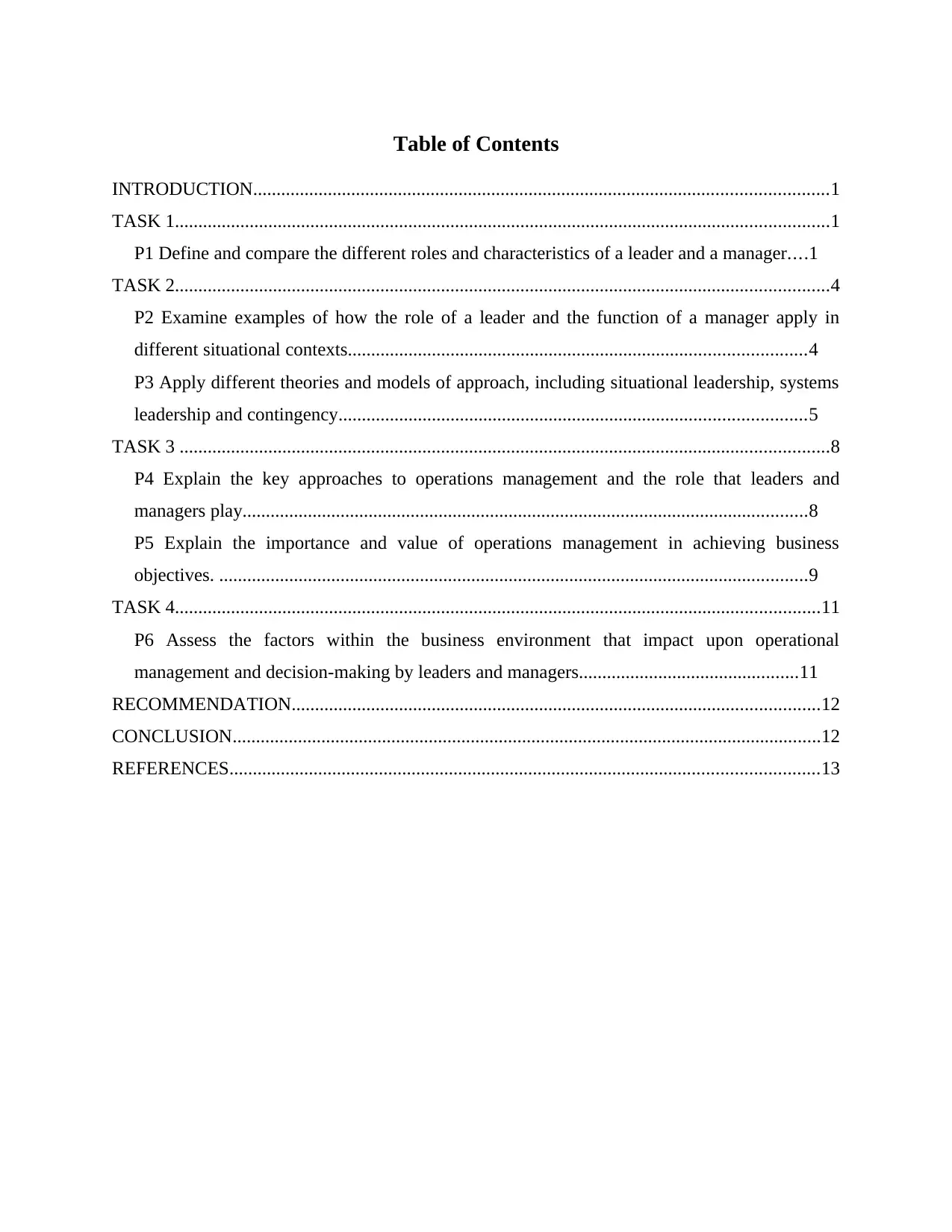
Table of Contents
INTRODUCTION...........................................................................................................................1
TASK 1............................................................................................................................................1
P1 Define and compare the different roles and characteristics of a leader and a manager....1
TASK 2............................................................................................................................................4
P2 Examine examples of how the role of a leader and the function of a manager apply in
different situational contexts..................................................................................................4
P3 Apply different theories and models of approach, including situational leadership, systems
leadership and contingency....................................................................................................5
TASK 3 ...........................................................................................................................................8
P4 Explain the key approaches to operations management and the role that leaders and
managers play.........................................................................................................................8
P5 Explain the importance and value of operations management in achieving business
objectives. ..............................................................................................................................9
TASK 4..........................................................................................................................................11
P6 Assess the factors within the business environment that impact upon operational
management and decision-making by leaders and managers...............................................11
RECOMMENDATION.................................................................................................................12
CONCLUSION..............................................................................................................................12
REFERENCES..............................................................................................................................13
INTRODUCTION...........................................................................................................................1
TASK 1............................................................................................................................................1
P1 Define and compare the different roles and characteristics of a leader and a manager....1
TASK 2............................................................................................................................................4
P2 Examine examples of how the role of a leader and the function of a manager apply in
different situational contexts..................................................................................................4
P3 Apply different theories and models of approach, including situational leadership, systems
leadership and contingency....................................................................................................5
TASK 3 ...........................................................................................................................................8
P4 Explain the key approaches to operations management and the role that leaders and
managers play.........................................................................................................................8
P5 Explain the importance and value of operations management in achieving business
objectives. ..............................................................................................................................9
TASK 4..........................................................................................................................................11
P6 Assess the factors within the business environment that impact upon operational
management and decision-making by leaders and managers...............................................11
RECOMMENDATION.................................................................................................................12
CONCLUSION..............................................................................................................................12
REFERENCES..............................................................................................................................13
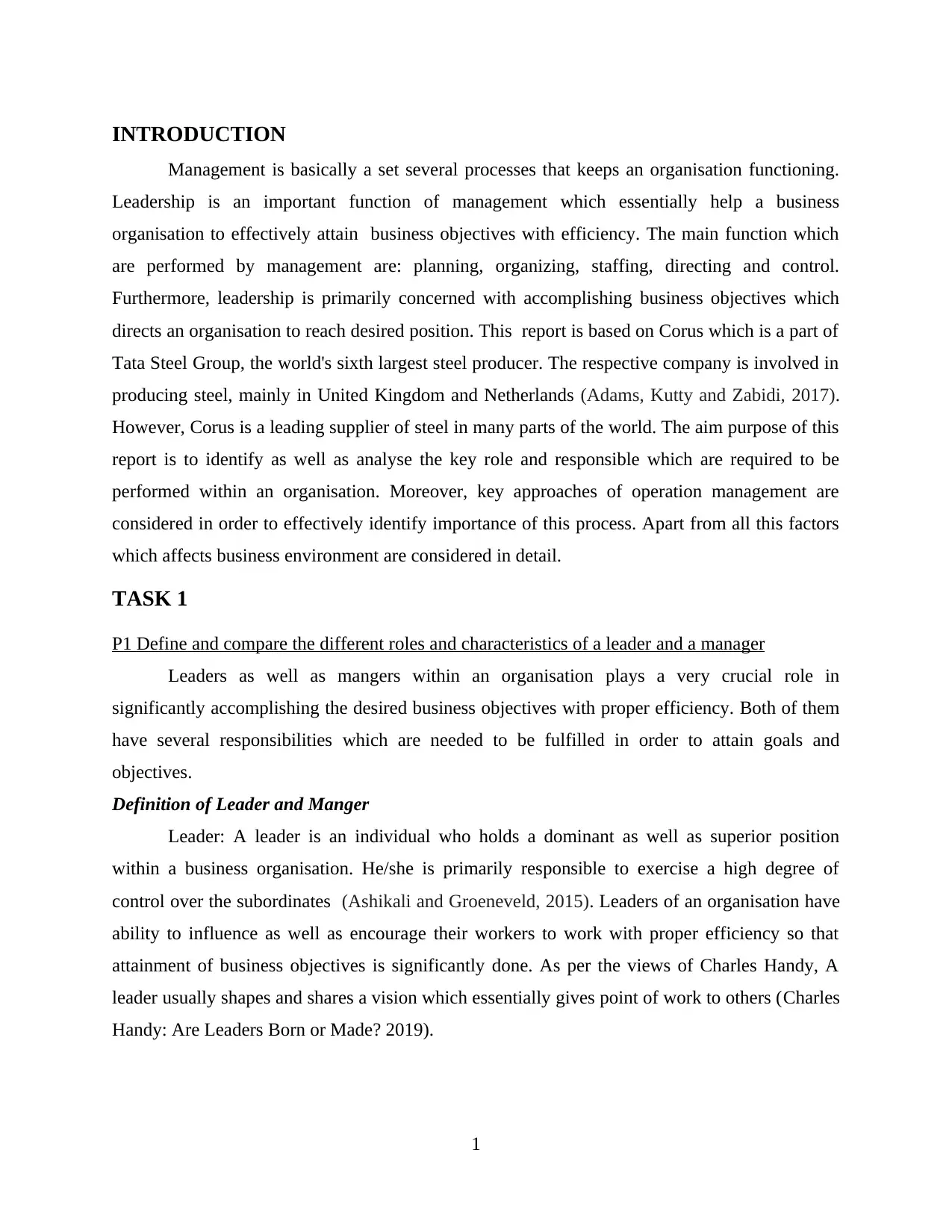
INTRODUCTION
Management is basically a set several processes that keeps an organisation functioning.
Leadership is an important function of management which essentially help a business
organisation to effectively attain business objectives with efficiency. The main function which
are performed by management are: planning, organizing, staffing, directing and control.
Furthermore, leadership is primarily concerned with accomplishing business objectives which
directs an organisation to reach desired position. This report is based on Corus which is a part of
Tata Steel Group, the world's sixth largest steel producer. The respective company is involved in
producing steel, mainly in United Kingdom and Netherlands (Adams, Kutty and Zabidi, 2017).
However, Corus is a leading supplier of steel in many parts of the world. The aim purpose of this
report is to identify as well as analyse the key role and responsible which are required to be
performed within an organisation. Moreover, key approaches of operation management are
considered in order to effectively identify importance of this process. Apart from all this factors
which affects business environment are considered in detail.
TASK 1
P1 Define and compare the different roles and characteristics of a leader and a manager
Leaders as well as mangers within an organisation plays a very crucial role in
significantly accomplishing the desired business objectives with proper efficiency. Both of them
have several responsibilities which are needed to be fulfilled in order to attain goals and
objectives.
Definition of Leader and Manger
Leader: A leader is an individual who holds a dominant as well as superior position
within a business organisation. He/she is primarily responsible to exercise a high degree of
control over the subordinates (Ashikali and Groeneveld, 2015). Leaders of an organisation have
ability to influence as well as encourage their workers to work with proper efficiency so that
attainment of business objectives is significantly done. As per the views of Charles Handy, A
leader usually shapes and shares a vision which essentially gives point of work to others (Charles
Handy: Are Leaders Born or Made? 2019).
1
Management is basically a set several processes that keeps an organisation functioning.
Leadership is an important function of management which essentially help a business
organisation to effectively attain business objectives with efficiency. The main function which
are performed by management are: planning, organizing, staffing, directing and control.
Furthermore, leadership is primarily concerned with accomplishing business objectives which
directs an organisation to reach desired position. This report is based on Corus which is a part of
Tata Steel Group, the world's sixth largest steel producer. The respective company is involved in
producing steel, mainly in United Kingdom and Netherlands (Adams, Kutty and Zabidi, 2017).
However, Corus is a leading supplier of steel in many parts of the world. The aim purpose of this
report is to identify as well as analyse the key role and responsible which are required to be
performed within an organisation. Moreover, key approaches of operation management are
considered in order to effectively identify importance of this process. Apart from all this factors
which affects business environment are considered in detail.
TASK 1
P1 Define and compare the different roles and characteristics of a leader and a manager
Leaders as well as mangers within an organisation plays a very crucial role in
significantly accomplishing the desired business objectives with proper efficiency. Both of them
have several responsibilities which are needed to be fulfilled in order to attain goals and
objectives.
Definition of Leader and Manger
Leader: A leader is an individual who holds a dominant as well as superior position
within a business organisation. He/she is primarily responsible to exercise a high degree of
control over the subordinates (Ashikali and Groeneveld, 2015). Leaders of an organisation have
ability to influence as well as encourage their workers to work with proper efficiency so that
attainment of business objectives is significantly done. As per the views of Charles Handy, A
leader usually shapes and shares a vision which essentially gives point of work to others (Charles
Handy: Are Leaders Born or Made? 2019).
1
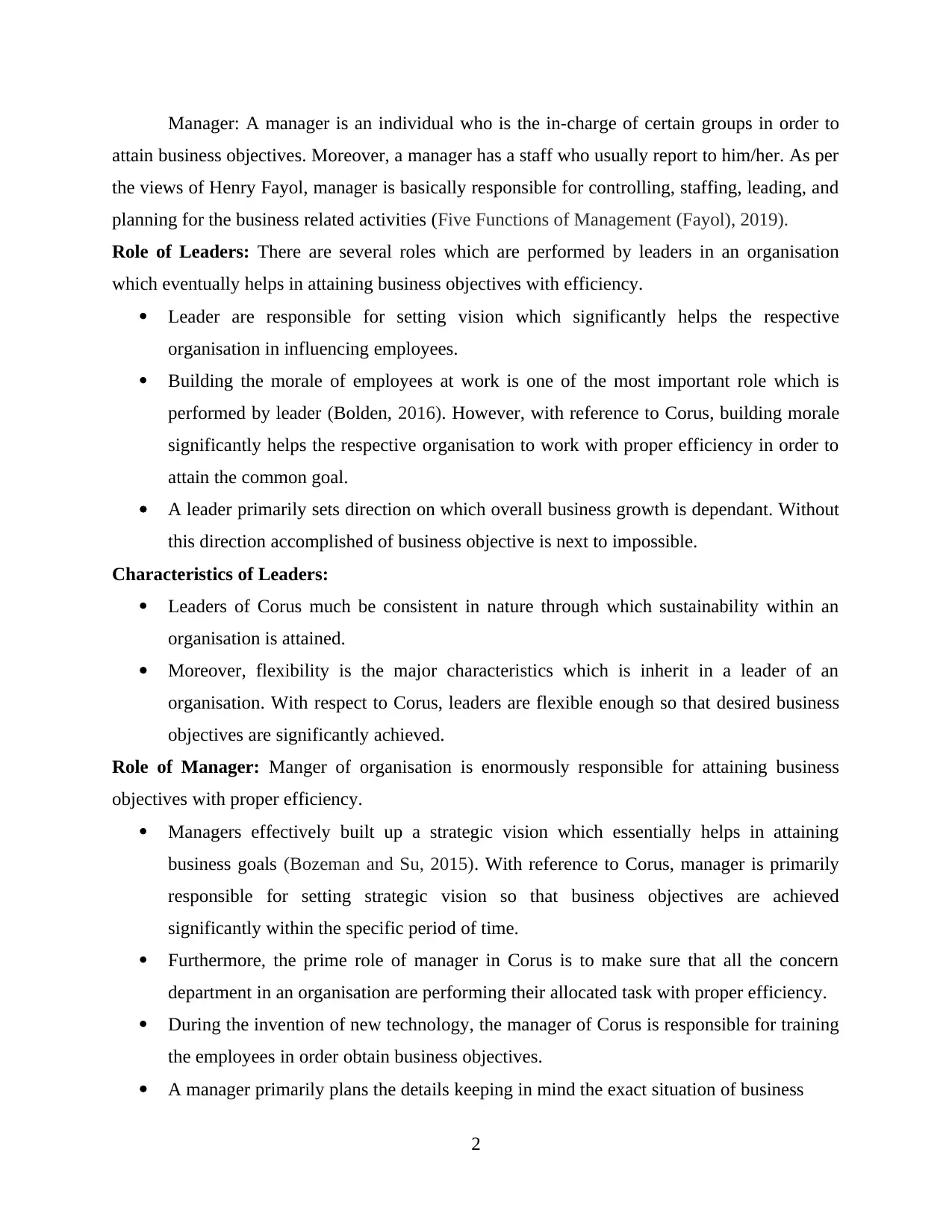
Manager: A manager is an individual who is the in-charge of certain groups in order to
attain business objectives. Moreover, a manager has a staff who usually report to him/her. As per
the views of Henry Fayol, manager is basically responsible for controlling, staffing, leading, and
planning for the business related activities (Five Functions of Management (Fayol), 2019).
Role of Leaders: There are several roles which are performed by leaders in an organisation
which eventually helps in attaining business objectives with efficiency.
Leader are responsible for setting vision which significantly helps the respective
organisation in influencing employees.
Building the morale of employees at work is one of the most important role which is
performed by leader (Bolden, 2016). However, with reference to Corus, building morale
significantly helps the respective organisation to work with proper efficiency in order to
attain the common goal.
A leader primarily sets direction on which overall business growth is dependant. Without
this direction accomplished of business objective is next to impossible.
Characteristics of Leaders:
Leaders of Corus much be consistent in nature through which sustainability within an
organisation is attained.
Moreover, flexibility is the major characteristics which is inherit in a leader of an
organisation. With respect to Corus, leaders are flexible enough so that desired business
objectives are significantly achieved.
Role of Manager: Manger of organisation is enormously responsible for attaining business
objectives with proper efficiency.
Managers effectively built up a strategic vision which essentially helps in attaining
business goals (Bozeman and Su, 2015). With reference to Corus, manager is primarily
responsible for setting strategic vision so that business objectives are achieved
significantly within the specific period of time.
Furthermore, the prime role of manager in Corus is to make sure that all the concern
department in an organisation are performing their allocated task with proper efficiency.
During the invention of new technology, the manager of Corus is responsible for training
the employees in order obtain business objectives.
A manager primarily plans the details keeping in mind the exact situation of business
2
attain business objectives. Moreover, a manager has a staff who usually report to him/her. As per
the views of Henry Fayol, manager is basically responsible for controlling, staffing, leading, and
planning for the business related activities (Five Functions of Management (Fayol), 2019).
Role of Leaders: There are several roles which are performed by leaders in an organisation
which eventually helps in attaining business objectives with efficiency.
Leader are responsible for setting vision which significantly helps the respective
organisation in influencing employees.
Building the morale of employees at work is one of the most important role which is
performed by leader (Bolden, 2016). However, with reference to Corus, building morale
significantly helps the respective organisation to work with proper efficiency in order to
attain the common goal.
A leader primarily sets direction on which overall business growth is dependant. Without
this direction accomplished of business objective is next to impossible.
Characteristics of Leaders:
Leaders of Corus much be consistent in nature through which sustainability within an
organisation is attained.
Moreover, flexibility is the major characteristics which is inherit in a leader of an
organisation. With respect to Corus, leaders are flexible enough so that desired business
objectives are significantly achieved.
Role of Manager: Manger of organisation is enormously responsible for attaining business
objectives with proper efficiency.
Managers effectively built up a strategic vision which essentially helps in attaining
business goals (Bozeman and Su, 2015). With reference to Corus, manager is primarily
responsible for setting strategic vision so that business objectives are achieved
significantly within the specific period of time.
Furthermore, the prime role of manager in Corus is to make sure that all the concern
department in an organisation are performing their allocated task with proper efficiency.
During the invention of new technology, the manager of Corus is responsible for training
the employees in order obtain business objectives.
A manager primarily plans the details keeping in mind the exact situation of business
2
Secure Best Marks with AI Grader
Need help grading? Try our AI Grader for instant feedback on your assignments.
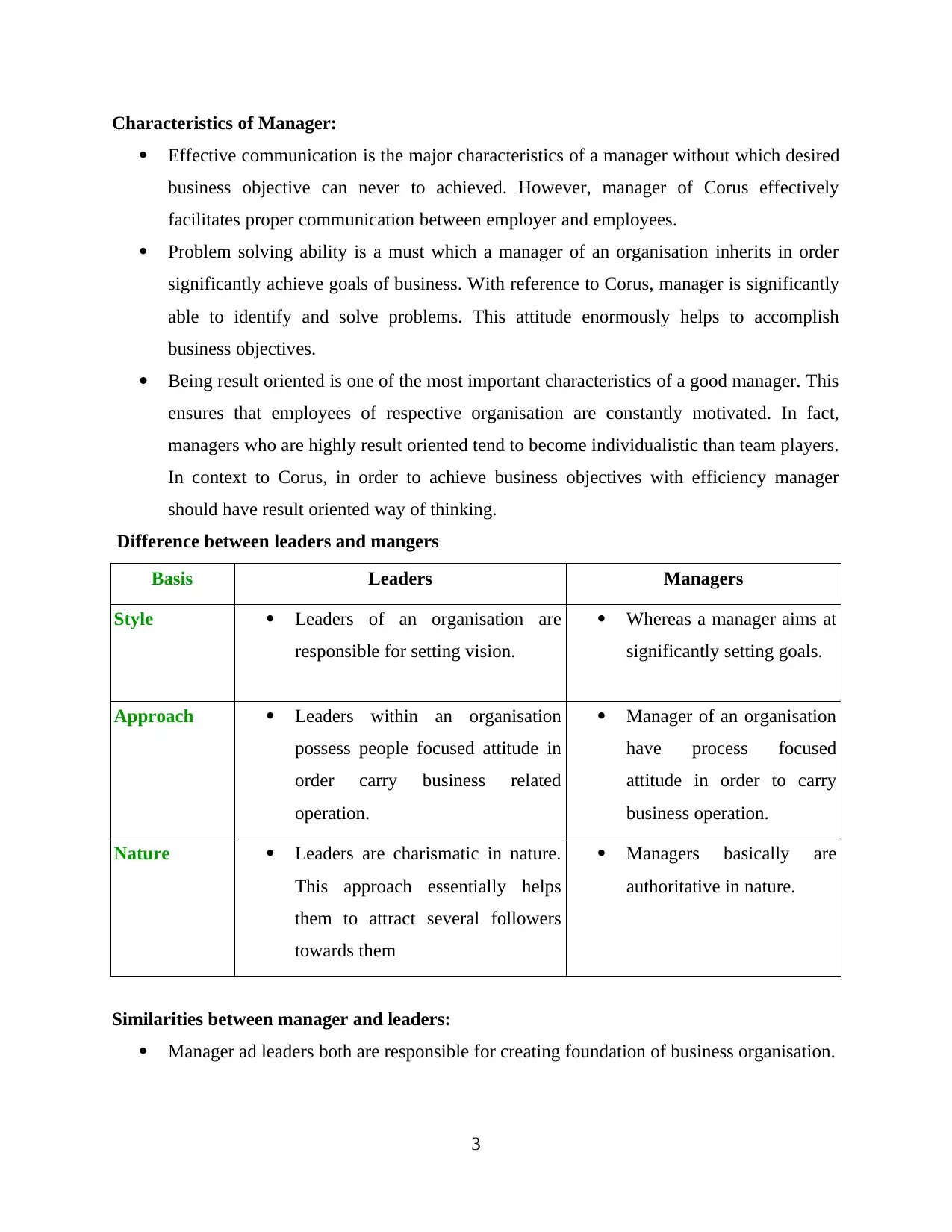
Characteristics of Manager:
Effective communication is the major characteristics of a manager without which desired
business objective can never to achieved. However, manager of Corus effectively
facilitates proper communication between employer and employees.
Problem solving ability is a must which a manager of an organisation inherits in order
significantly achieve goals of business. With reference to Corus, manager is significantly
able to identify and solve problems. This attitude enormously helps to accomplish
business objectives.
Being result oriented is one of the most important characteristics of a good manager. This
ensures that employees of respective organisation are constantly motivated. In fact,
managers who are highly result oriented tend to become individualistic than team players.
In context to Corus, in order to achieve business objectives with efficiency manager
should have result oriented way of thinking.
Difference between leaders and mangers
Basis Leaders Managers
Style Leaders of an organisation are
responsible for setting vision.
Whereas a manager aims at
significantly setting goals.
Approach Leaders within an organisation
possess people focused attitude in
order carry business related
operation.
Manager of an organisation
have process focused
attitude in order to carry
business operation.
Nature Leaders are charismatic in nature.
This approach essentially helps
them to attract several followers
towards them
Managers basically are
authoritative in nature.
Similarities between manager and leaders:
Manager ad leaders both are responsible for creating foundation of business organisation.
3
Effective communication is the major characteristics of a manager without which desired
business objective can never to achieved. However, manager of Corus effectively
facilitates proper communication between employer and employees.
Problem solving ability is a must which a manager of an organisation inherits in order
significantly achieve goals of business. With reference to Corus, manager is significantly
able to identify and solve problems. This attitude enormously helps to accomplish
business objectives.
Being result oriented is one of the most important characteristics of a good manager. This
ensures that employees of respective organisation are constantly motivated. In fact,
managers who are highly result oriented tend to become individualistic than team players.
In context to Corus, in order to achieve business objectives with efficiency manager
should have result oriented way of thinking.
Difference between leaders and mangers
Basis Leaders Managers
Style Leaders of an organisation are
responsible for setting vision.
Whereas a manager aims at
significantly setting goals.
Approach Leaders within an organisation
possess people focused attitude in
order carry business related
operation.
Manager of an organisation
have process focused
attitude in order to carry
business operation.
Nature Leaders are charismatic in nature.
This approach essentially helps
them to attract several followers
towards them
Managers basically are
authoritative in nature.
Similarities between manager and leaders:
Manager ad leaders both are responsible for creating foundation of business organisation.
3
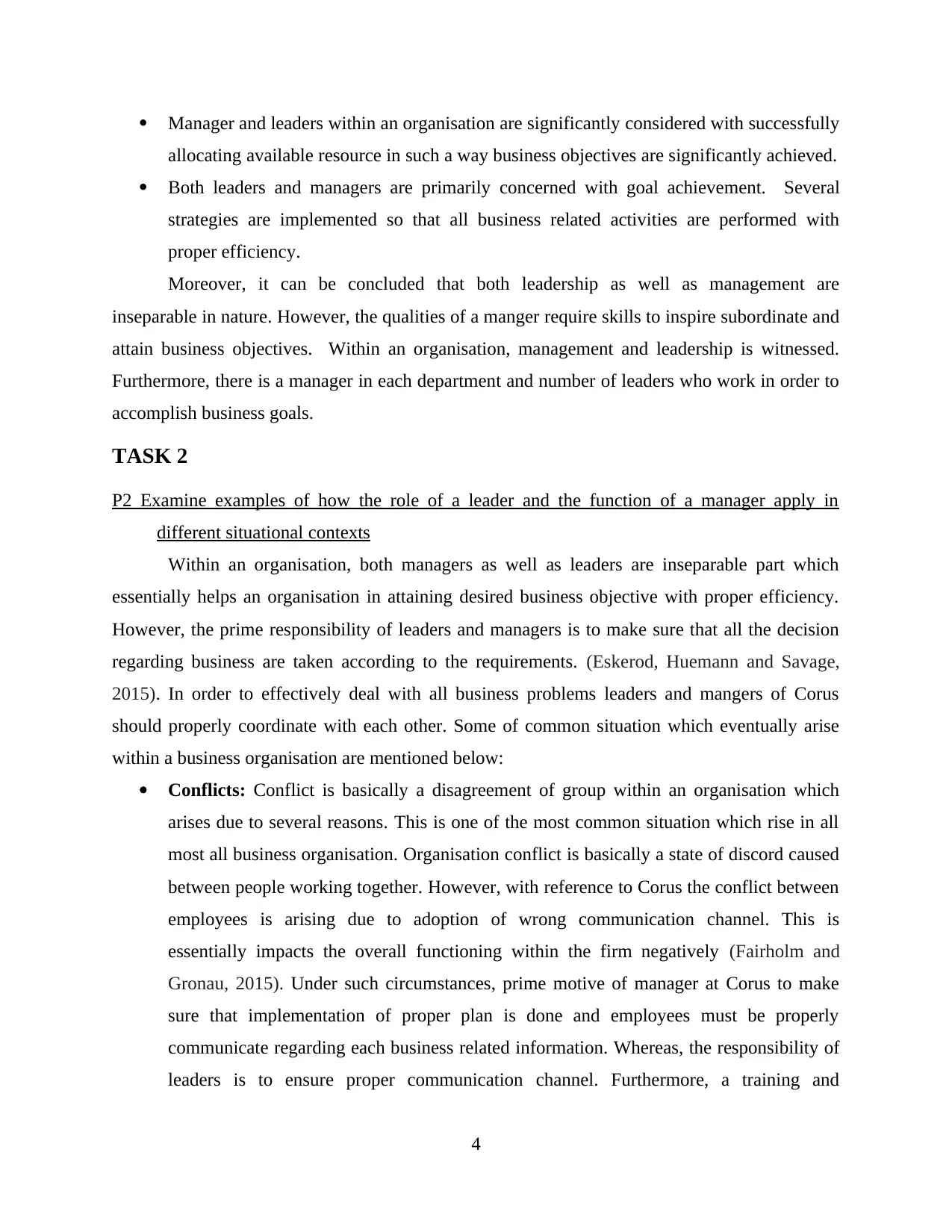
Manager and leaders within an organisation are significantly considered with successfully
allocating available resource in such a way business objectives are significantly achieved.
Both leaders and managers are primarily concerned with goal achievement. Several
strategies are implemented so that all business related activities are performed with
proper efficiency.
Moreover, it can be concluded that both leadership as well as management are
inseparable in nature. However, the qualities of a manger require skills to inspire subordinate and
attain business objectives. Within an organisation, management and leadership is witnessed.
Furthermore, there is a manager in each department and number of leaders who work in order to
accomplish business goals.
TASK 2
P2 Examine examples of how the role of a leader and the function of a manager apply in
different situational contexts
Within an organisation, both managers as well as leaders are inseparable part which
essentially helps an organisation in attaining desired business objective with proper efficiency.
However, the prime responsibility of leaders and managers is to make sure that all the decision
regarding business are taken according to the requirements. (Eskerod, Huemann and Savage,
2015). In order to effectively deal with all business problems leaders and mangers of Corus
should properly coordinate with each other. Some of common situation which eventually arise
within a business organisation are mentioned below:
Conflicts: Conflict is basically a disagreement of group within an organisation which
arises due to several reasons. This is one of the most common situation which rise in all
most all business organisation. Organisation conflict is basically a state of discord caused
between people working together. However, with reference to Corus the conflict between
employees is arising due to adoption of wrong communication channel. This is
essentially impacts the overall functioning within the firm negatively (Fairholm and
Gronau, 2015). Under such circumstances, prime motive of manager at Corus to make
sure that implementation of proper plan is done and employees must be properly
communicate regarding each business related information. Whereas, the responsibility of
leaders is to ensure proper communication channel. Furthermore, a training and
4
allocating available resource in such a way business objectives are significantly achieved.
Both leaders and managers are primarily concerned with goal achievement. Several
strategies are implemented so that all business related activities are performed with
proper efficiency.
Moreover, it can be concluded that both leadership as well as management are
inseparable in nature. However, the qualities of a manger require skills to inspire subordinate and
attain business objectives. Within an organisation, management and leadership is witnessed.
Furthermore, there is a manager in each department and number of leaders who work in order to
accomplish business goals.
TASK 2
P2 Examine examples of how the role of a leader and the function of a manager apply in
different situational contexts
Within an organisation, both managers as well as leaders are inseparable part which
essentially helps an organisation in attaining desired business objective with proper efficiency.
However, the prime responsibility of leaders and managers is to make sure that all the decision
regarding business are taken according to the requirements. (Eskerod, Huemann and Savage,
2015). In order to effectively deal with all business problems leaders and mangers of Corus
should properly coordinate with each other. Some of common situation which eventually arise
within a business organisation are mentioned below:
Conflicts: Conflict is basically a disagreement of group within an organisation which
arises due to several reasons. This is one of the most common situation which rise in all
most all business organisation. Organisation conflict is basically a state of discord caused
between people working together. However, with reference to Corus the conflict between
employees is arising due to adoption of wrong communication channel. This is
essentially impacts the overall functioning within the firm negatively (Fairholm and
Gronau, 2015). Under such circumstances, prime motive of manager at Corus to make
sure that implementation of proper plan is done and employees must be properly
communicate regarding each business related information. Whereas, the responsibility of
leaders is to ensure proper communication channel. Furthermore, a training and
4
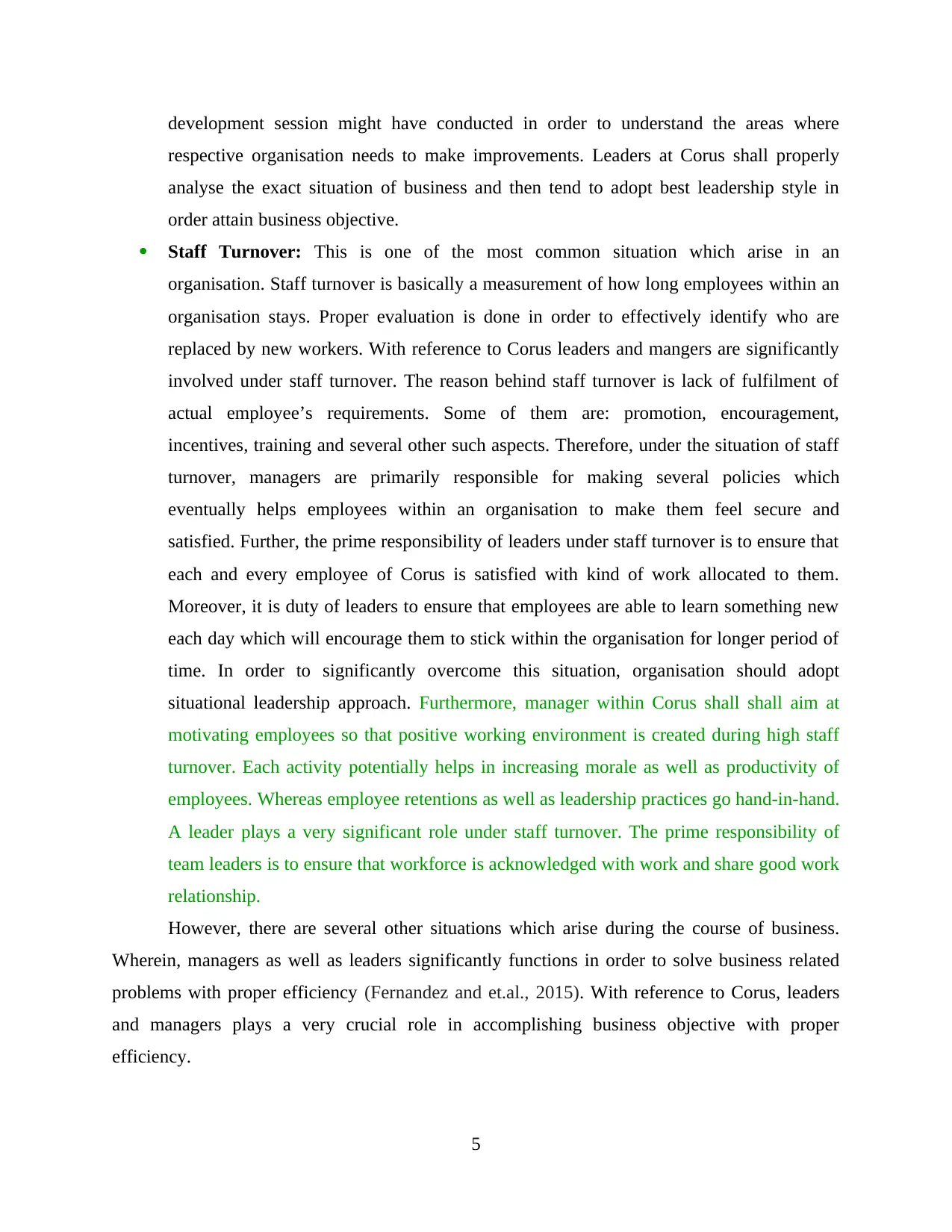
development session might have conducted in order to understand the areas where
respective organisation needs to make improvements. Leaders at Corus shall properly
analyse the exact situation of business and then tend to adopt best leadership style in
order attain business objective.
Staff Turnover: This is one of the most common situation which arise in an
organisation. Staff turnover is basically a measurement of how long employees within an
organisation stays. Proper evaluation is done in order to effectively identify who are
replaced by new workers. With reference to Corus leaders and mangers are significantly
involved under staff turnover. The reason behind staff turnover is lack of fulfilment of
actual employee’s requirements. Some of them are: promotion, encouragement,
incentives, training and several other such aspects. Therefore, under the situation of staff
turnover, managers are primarily responsible for making several policies which
eventually helps employees within an organisation to make them feel secure and
satisfied. Further, the prime responsibility of leaders under staff turnover is to ensure that
each and every employee of Corus is satisfied with kind of work allocated to them.
Moreover, it is duty of leaders to ensure that employees are able to learn something new
each day which will encourage them to stick within the organisation for longer period of
time. In order to significantly overcome this situation, organisation should adopt
situational leadership approach. Furthermore, manager within Corus shall shall aim at
motivating employees so that positive working environment is created during high staff
turnover. Each activity potentially helps in increasing morale as well as productivity of
employees. Whereas employee retentions as well as leadership practices go hand-in-hand.
A leader plays a very significant role under staff turnover. The prime responsibility of
team leaders is to ensure that workforce is acknowledged with work and share good work
relationship.
However, there are several other situations which arise during the course of business.
Wherein, managers as well as leaders significantly functions in order to solve business related
problems with proper efficiency (Fernandez and et.al., 2015). With reference to Corus, leaders
and managers plays a very crucial role in accomplishing business objective with proper
efficiency.
5
respective organisation needs to make improvements. Leaders at Corus shall properly
analyse the exact situation of business and then tend to adopt best leadership style in
order attain business objective.
Staff Turnover: This is one of the most common situation which arise in an
organisation. Staff turnover is basically a measurement of how long employees within an
organisation stays. Proper evaluation is done in order to effectively identify who are
replaced by new workers. With reference to Corus leaders and mangers are significantly
involved under staff turnover. The reason behind staff turnover is lack of fulfilment of
actual employee’s requirements. Some of them are: promotion, encouragement,
incentives, training and several other such aspects. Therefore, under the situation of staff
turnover, managers are primarily responsible for making several policies which
eventually helps employees within an organisation to make them feel secure and
satisfied. Further, the prime responsibility of leaders under staff turnover is to ensure that
each and every employee of Corus is satisfied with kind of work allocated to them.
Moreover, it is duty of leaders to ensure that employees are able to learn something new
each day which will encourage them to stick within the organisation for longer period of
time. In order to significantly overcome this situation, organisation should adopt
situational leadership approach. Furthermore, manager within Corus shall shall aim at
motivating employees so that positive working environment is created during high staff
turnover. Each activity potentially helps in increasing morale as well as productivity of
employees. Whereas employee retentions as well as leadership practices go hand-in-hand.
A leader plays a very significant role under staff turnover. The prime responsibility of
team leaders is to ensure that workforce is acknowledged with work and share good work
relationship.
However, there are several other situations which arise during the course of business.
Wherein, managers as well as leaders significantly functions in order to solve business related
problems with proper efficiency (Fernandez and et.al., 2015). With reference to Corus, leaders
and managers plays a very crucial role in accomplishing business objective with proper
efficiency.
5
Paraphrase This Document
Need a fresh take? Get an instant paraphrase of this document with our AI Paraphraser
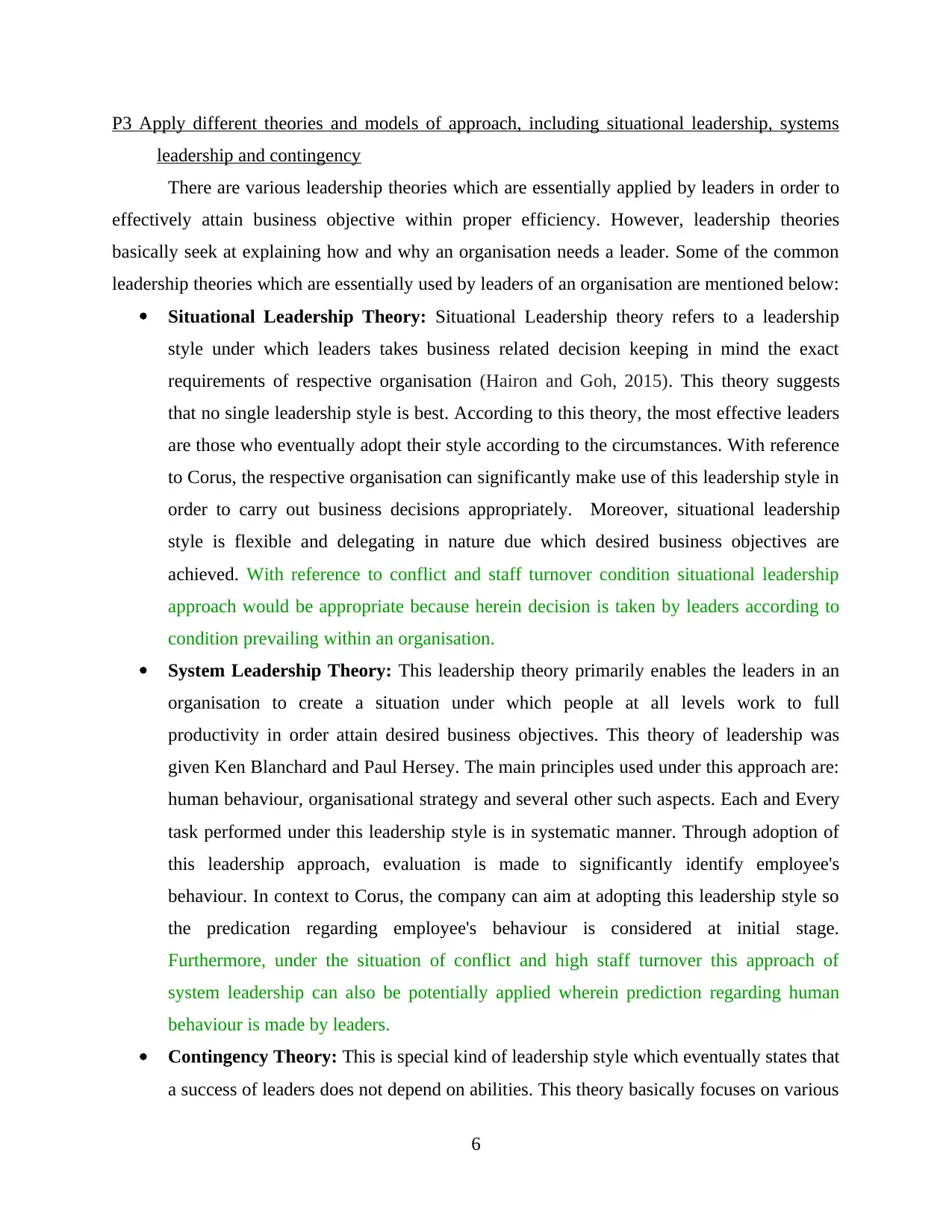
P3 Apply different theories and models of approach, including situational leadership, systems
leadership and contingency
There are various leadership theories which are essentially applied by leaders in order to
effectively attain business objective within proper efficiency. However, leadership theories
basically seek at explaining how and why an organisation needs a leader. Some of the common
leadership theories which are essentially used by leaders of an organisation are mentioned below:
Situational Leadership Theory: Situational Leadership theory refers to a leadership
style under which leaders takes business related decision keeping in mind the exact
requirements of respective organisation (Hairon and Goh, 2015). This theory suggests
that no single leadership style is best. According to this theory, the most effective leaders
are those who eventually adopt their style according to the circumstances. With reference
to Corus, the respective organisation can significantly make use of this leadership style in
order to carry out business decisions appropriately. Moreover, situational leadership
style is flexible and delegating in nature due which desired business objectives are
achieved. With reference to conflict and staff turnover condition situational leadership
approach would be appropriate because herein decision is taken by leaders according to
condition prevailing within an organisation.
System Leadership Theory: This leadership theory primarily enables the leaders in an
organisation to create a situation under which people at all levels work to full
productivity in order attain desired business objectives. This theory of leadership was
given Ken Blanchard and Paul Hersey. The main principles used under this approach are:
human behaviour, organisational strategy and several other such aspects. Each and Every
task performed under this leadership style is in systematic manner. Through adoption of
this leadership approach, evaluation is made to significantly identify employee's
behaviour. In context to Corus, the company can aim at adopting this leadership style so
the predication regarding employee's behaviour is considered at initial stage.
Furthermore, under the situation of conflict and high staff turnover this approach of
system leadership can also be potentially applied wherein prediction regarding human
behaviour is made by leaders.
Contingency Theory: This is special kind of leadership style which eventually states that
a success of leaders does not depend on abilities. This theory basically focuses on various
6
leadership and contingency
There are various leadership theories which are essentially applied by leaders in order to
effectively attain business objective within proper efficiency. However, leadership theories
basically seek at explaining how and why an organisation needs a leader. Some of the common
leadership theories which are essentially used by leaders of an organisation are mentioned below:
Situational Leadership Theory: Situational Leadership theory refers to a leadership
style under which leaders takes business related decision keeping in mind the exact
requirements of respective organisation (Hairon and Goh, 2015). This theory suggests
that no single leadership style is best. According to this theory, the most effective leaders
are those who eventually adopt their style according to the circumstances. With reference
to Corus, the respective organisation can significantly make use of this leadership style in
order to carry out business decisions appropriately. Moreover, situational leadership
style is flexible and delegating in nature due which desired business objectives are
achieved. With reference to conflict and staff turnover condition situational leadership
approach would be appropriate because herein decision is taken by leaders according to
condition prevailing within an organisation.
System Leadership Theory: This leadership theory primarily enables the leaders in an
organisation to create a situation under which people at all levels work to full
productivity in order attain desired business objectives. This theory of leadership was
given Ken Blanchard and Paul Hersey. The main principles used under this approach are:
human behaviour, organisational strategy and several other such aspects. Each and Every
task performed under this leadership style is in systematic manner. Through adoption of
this leadership approach, evaluation is made to significantly identify employee's
behaviour. In context to Corus, the company can aim at adopting this leadership style so
the predication regarding employee's behaviour is considered at initial stage.
Furthermore, under the situation of conflict and high staff turnover this approach of
system leadership can also be potentially applied wherein prediction regarding human
behaviour is made by leaders.
Contingency Theory: This is special kind of leadership style which eventually states that
a success of leaders does not depend on abilities. This theory basically focuses on various
6
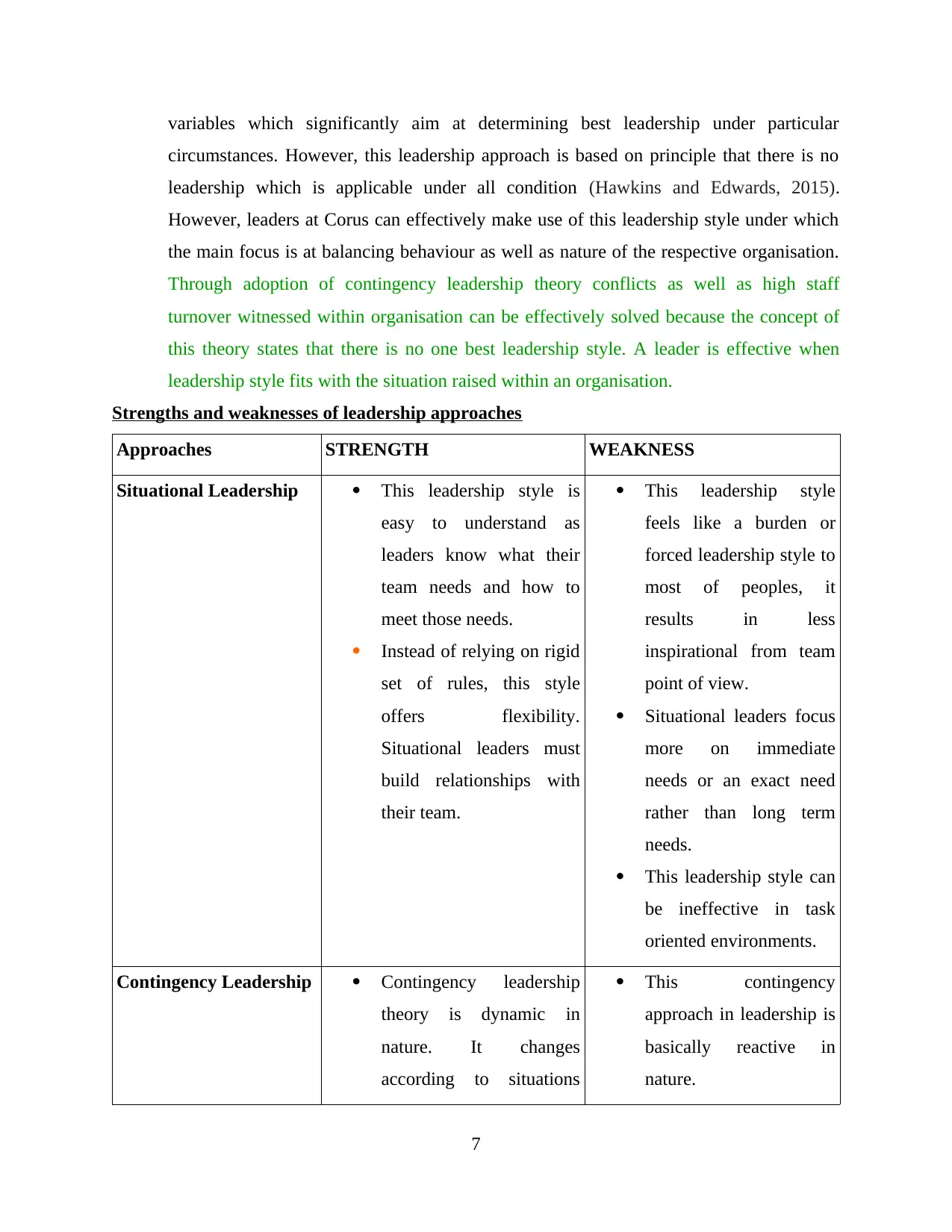
variables which significantly aim at determining best leadership under particular
circumstances. However, this leadership approach is based on principle that there is no
leadership which is applicable under all condition (Hawkins and Edwards, 2015).
However, leaders at Corus can effectively make use of this leadership style under which
the main focus is at balancing behaviour as well as nature of the respective organisation.
Through adoption of contingency leadership theory conflicts as well as high staff
turnover witnessed within organisation can be effectively solved because the concept of
this theory states that there is no one best leadership style. A leader is effective when
leadership style fits with the situation raised within an organisation.
Strengths and weaknesses of leadership approaches
Approaches STRENGTH WEAKNESS
Situational Leadership This leadership style is
easy to understand as
leaders know what their
team needs and how to
meet those needs.
Instead of relying on rigid
set of rules, this style
offers flexibility.
Situational leaders must
build relationships with
their team.
This leadership style
feels like a burden or
forced leadership style to
most of peoples, it
results in less
inspirational from team
point of view.
Situational leaders focus
more on immediate
needs or an exact need
rather than long term
needs.
This leadership style can
be ineffective in task
oriented environments.
Contingency Leadership Contingency leadership
theory is dynamic in
nature. It changes
according to situations
This contingency
approach in leadership is
basically reactive in
nature.
7
circumstances. However, this leadership approach is based on principle that there is no
leadership which is applicable under all condition (Hawkins and Edwards, 2015).
However, leaders at Corus can effectively make use of this leadership style under which
the main focus is at balancing behaviour as well as nature of the respective organisation.
Through adoption of contingency leadership theory conflicts as well as high staff
turnover witnessed within organisation can be effectively solved because the concept of
this theory states that there is no one best leadership style. A leader is effective when
leadership style fits with the situation raised within an organisation.
Strengths and weaknesses of leadership approaches
Approaches STRENGTH WEAKNESS
Situational Leadership This leadership style is
easy to understand as
leaders know what their
team needs and how to
meet those needs.
Instead of relying on rigid
set of rules, this style
offers flexibility.
Situational leaders must
build relationships with
their team.
This leadership style
feels like a burden or
forced leadership style to
most of peoples, it
results in less
inspirational from team
point of view.
Situational leaders focus
more on immediate
needs or an exact need
rather than long term
needs.
This leadership style can
be ineffective in task
oriented environments.
Contingency Leadership Contingency leadership
theory is dynamic in
nature. It changes
according to situations
This contingency
approach in leadership is
basically reactive in
nature.
7
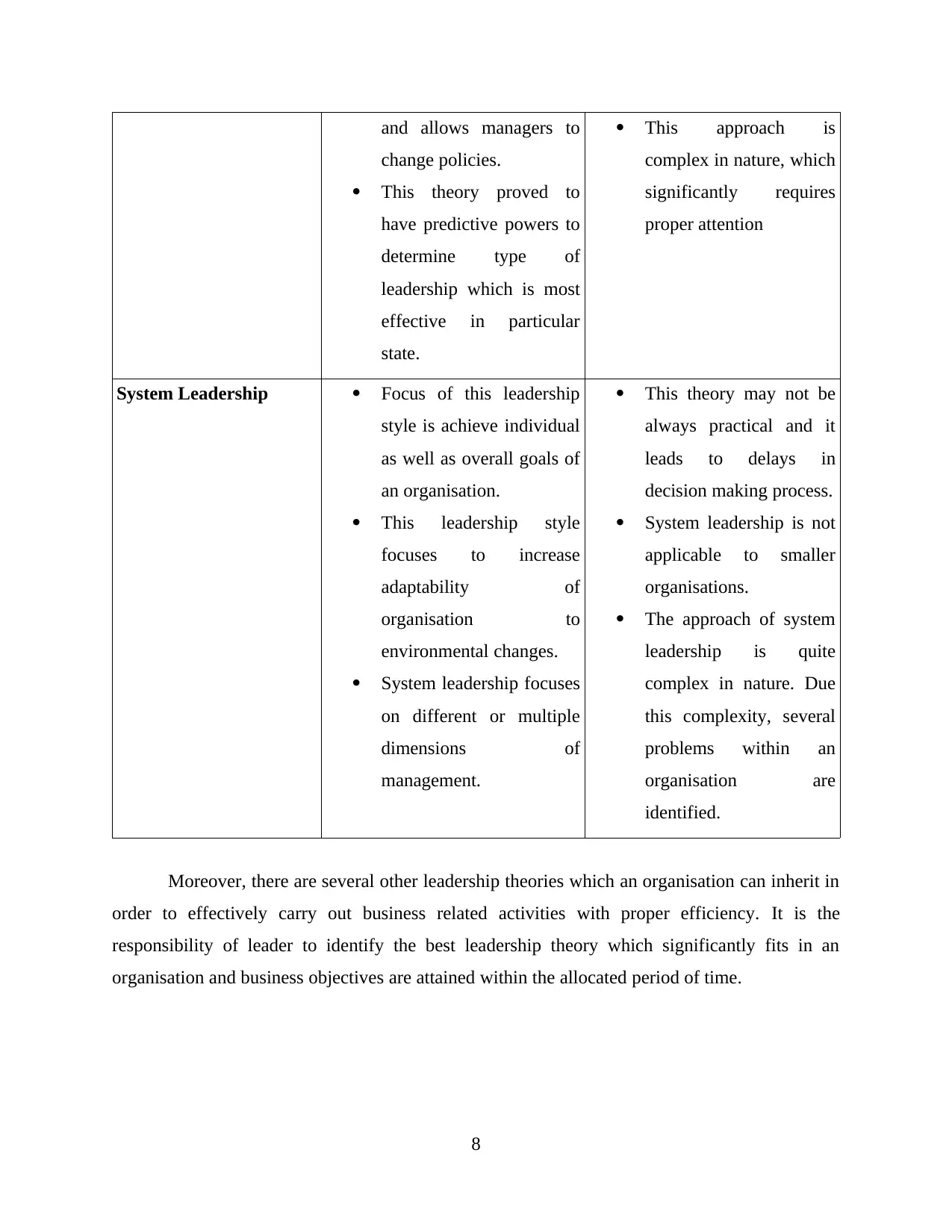
and allows managers to
change policies.
This theory proved to
have predictive powers to
determine type of
leadership which is most
effective in particular
state.
This approach is
complex in nature, which
significantly requires
proper attention
System Leadership Focus of this leadership
style is achieve individual
as well as overall goals of
an organisation.
This leadership style
focuses to increase
adaptability of
organisation to
environmental changes.
System leadership focuses
on different or multiple
dimensions of
management.
This theory may not be
always practical and it
leads to delays in
decision making process.
System leadership is not
applicable to smaller
organisations.
The approach of system
leadership is quite
complex in nature. Due
this complexity, several
problems within an
organisation are
identified.
Moreover, there are several other leadership theories which an organisation can inherit in
order to effectively carry out business related activities with proper efficiency. It is the
responsibility of leader to identify the best leadership theory which significantly fits in an
organisation and business objectives are attained within the allocated period of time.
8
change policies.
This theory proved to
have predictive powers to
determine type of
leadership which is most
effective in particular
state.
This approach is
complex in nature, which
significantly requires
proper attention
System Leadership Focus of this leadership
style is achieve individual
as well as overall goals of
an organisation.
This leadership style
focuses to increase
adaptability of
organisation to
environmental changes.
System leadership focuses
on different or multiple
dimensions of
management.
This theory may not be
always practical and it
leads to delays in
decision making process.
System leadership is not
applicable to smaller
organisations.
The approach of system
leadership is quite
complex in nature. Due
this complexity, several
problems within an
organisation are
identified.
Moreover, there are several other leadership theories which an organisation can inherit in
order to effectively carry out business related activities with proper efficiency. It is the
responsibility of leader to identify the best leadership theory which significantly fits in an
organisation and business objectives are attained within the allocated period of time.
8
Secure Best Marks with AI Grader
Need help grading? Try our AI Grader for instant feedback on your assignments.
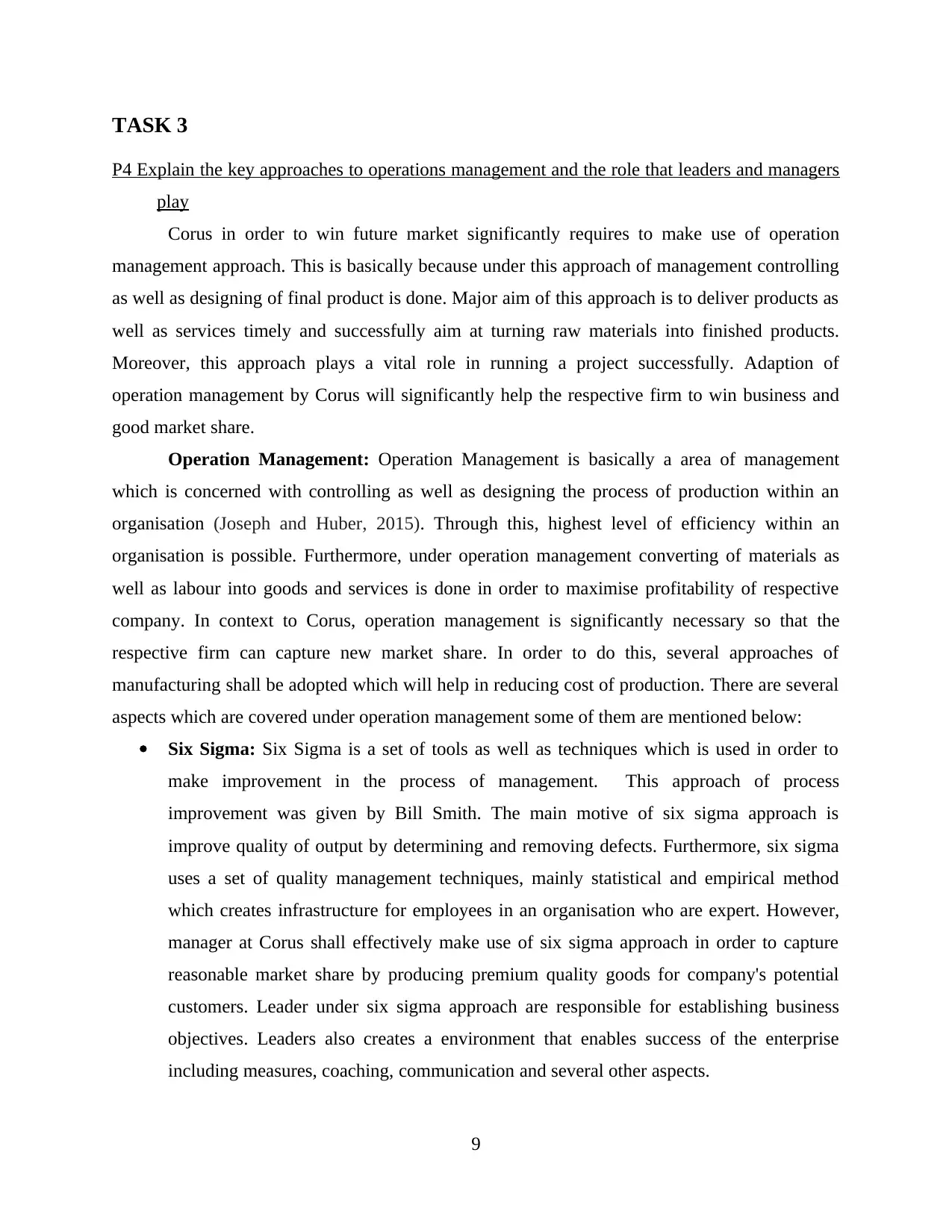
TASK 3
P4 Explain the key approaches to operations management and the role that leaders and managers
play
Corus in order to win future market significantly requires to make use of operation
management approach. This is basically because under this approach of management controlling
as well as designing of final product is done. Major aim of this approach is to deliver products as
well as services timely and successfully aim at turning raw materials into finished products.
Moreover, this approach plays a vital role in running a project successfully. Adaption of
operation management by Corus will significantly help the respective firm to win business and
good market share.
Operation Management: Operation Management is basically a area of management
which is concerned with controlling as well as designing the process of production within an
organisation (Joseph and Huber, 2015). Through this, highest level of efficiency within an
organisation is possible. Furthermore, under operation management converting of materials as
well as labour into goods and services is done in order to maximise profitability of respective
company. In context to Corus, operation management is significantly necessary so that the
respective firm can capture new market share. In order to do this, several approaches of
manufacturing shall be adopted which will help in reducing cost of production. There are several
aspects which are covered under operation management some of them are mentioned below:
Six Sigma: Six Sigma is a set of tools as well as techniques which is used in order to
make improvement in the process of management. This approach of process
improvement was given by Bill Smith. The main motive of six sigma approach is
improve quality of output by determining and removing defects. Furthermore, six sigma
uses a set of quality management techniques, mainly statistical and empirical method
which creates infrastructure for employees in an organisation who are expert. However,
manager at Corus shall effectively make use of six sigma approach in order to capture
reasonable market share by producing premium quality goods for company's potential
customers. Leader under six sigma approach are responsible for establishing business
objectives. Leaders also creates a environment that enables success of the enterprise
including measures, coaching, communication and several other aspects.
9
P4 Explain the key approaches to operations management and the role that leaders and managers
play
Corus in order to win future market significantly requires to make use of operation
management approach. This is basically because under this approach of management controlling
as well as designing of final product is done. Major aim of this approach is to deliver products as
well as services timely and successfully aim at turning raw materials into finished products.
Moreover, this approach plays a vital role in running a project successfully. Adaption of
operation management by Corus will significantly help the respective firm to win business and
good market share.
Operation Management: Operation Management is basically a area of management
which is concerned with controlling as well as designing the process of production within an
organisation (Joseph and Huber, 2015). Through this, highest level of efficiency within an
organisation is possible. Furthermore, under operation management converting of materials as
well as labour into goods and services is done in order to maximise profitability of respective
company. In context to Corus, operation management is significantly necessary so that the
respective firm can capture new market share. In order to do this, several approaches of
manufacturing shall be adopted which will help in reducing cost of production. There are several
aspects which are covered under operation management some of them are mentioned below:
Six Sigma: Six Sigma is a set of tools as well as techniques which is used in order to
make improvement in the process of management. This approach of process
improvement was given by Bill Smith. The main motive of six sigma approach is
improve quality of output by determining and removing defects. Furthermore, six sigma
uses a set of quality management techniques, mainly statistical and empirical method
which creates infrastructure for employees in an organisation who are expert. However,
manager at Corus shall effectively make use of six sigma approach in order to capture
reasonable market share by producing premium quality goods for company's potential
customers. Leader under six sigma approach are responsible for establishing business
objectives. Leaders also creates a environment that enables success of the enterprise
including measures, coaching, communication and several other aspects.
9
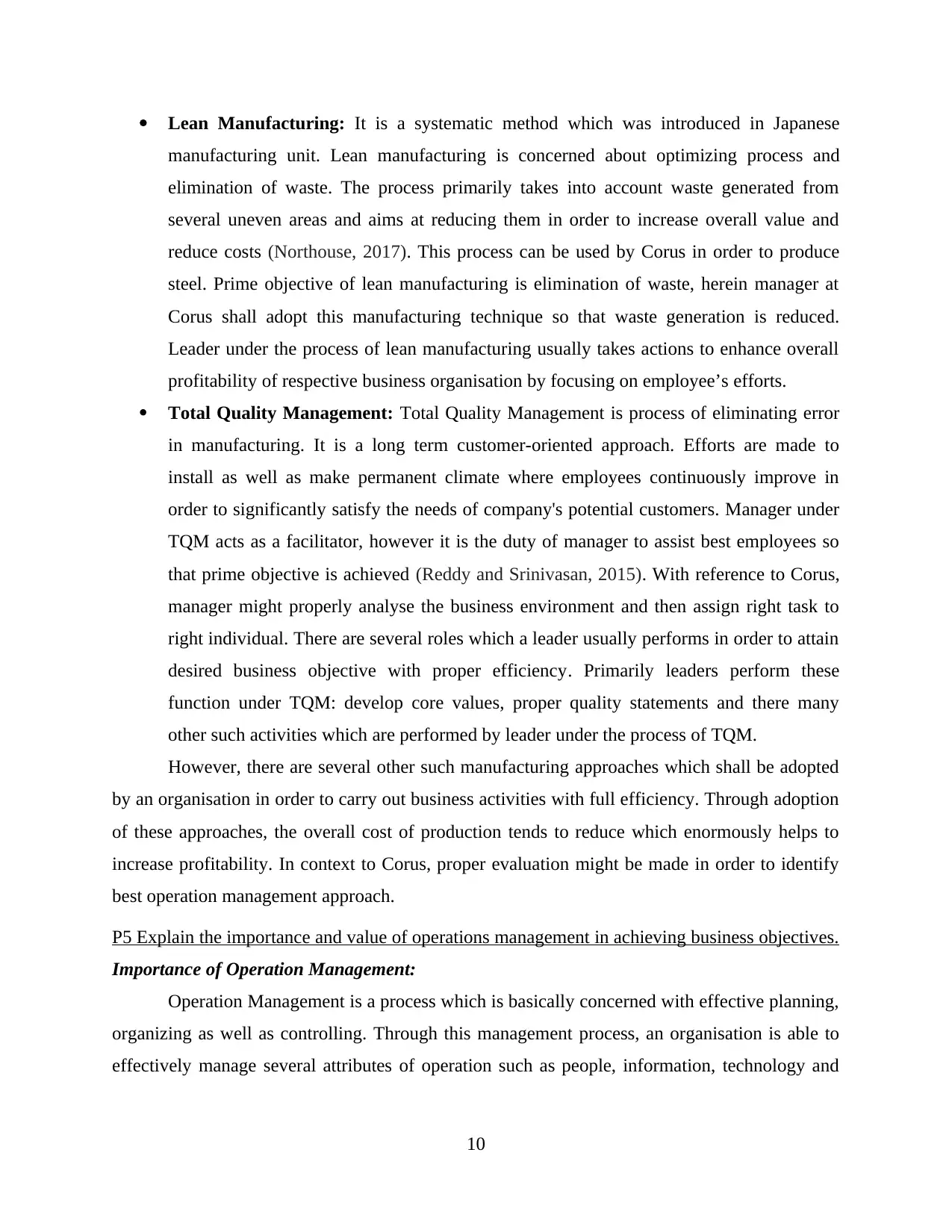
Lean Manufacturing: It is a systematic method which was introduced in Japanese
manufacturing unit. Lean manufacturing is concerned about optimizing process and
elimination of waste. The process primarily takes into account waste generated from
several uneven areas and aims at reducing them in order to increase overall value and
reduce costs (Northouse, 2017). This process can be used by Corus in order to produce
steel. Prime objective of lean manufacturing is elimination of waste, herein manager at
Corus shall adopt this manufacturing technique so that waste generation is reduced.
Leader under the process of lean manufacturing usually takes actions to enhance overall
profitability of respective business organisation by focusing on employee’s efforts.
Total Quality Management: Total Quality Management is process of eliminating error
in manufacturing. It is a long term customer-oriented approach. Efforts are made to
install as well as make permanent climate where employees continuously improve in
order to significantly satisfy the needs of company's potential customers. Manager under
TQM acts as a facilitator, however it is the duty of manager to assist best employees so
that prime objective is achieved (Reddy and Srinivasan, 2015). With reference to Corus,
manager might properly analyse the business environment and then assign right task to
right individual. There are several roles which a leader usually performs in order to attain
desired business objective with proper efficiency. Primarily leaders perform these
function under TQM: develop core values, proper quality statements and there many
other such activities which are performed by leader under the process of TQM.
However, there are several other such manufacturing approaches which shall be adopted
by an organisation in order to carry out business activities with full efficiency. Through adoption
of these approaches, the overall cost of production tends to reduce which enormously helps to
increase profitability. In context to Corus, proper evaluation might be made in order to identify
best operation management approach.
P5 Explain the importance and value of operations management in achieving business objectives.
Importance of Operation Management:
Operation Management is a process which is basically concerned with effective planning,
organizing as well as controlling. Through this management process, an organisation is able to
effectively manage several attributes of operation such as people, information, technology and
10
manufacturing unit. Lean manufacturing is concerned about optimizing process and
elimination of waste. The process primarily takes into account waste generated from
several uneven areas and aims at reducing them in order to increase overall value and
reduce costs (Northouse, 2017). This process can be used by Corus in order to produce
steel. Prime objective of lean manufacturing is elimination of waste, herein manager at
Corus shall adopt this manufacturing technique so that waste generation is reduced.
Leader under the process of lean manufacturing usually takes actions to enhance overall
profitability of respective business organisation by focusing on employee’s efforts.
Total Quality Management: Total Quality Management is process of eliminating error
in manufacturing. It is a long term customer-oriented approach. Efforts are made to
install as well as make permanent climate where employees continuously improve in
order to significantly satisfy the needs of company's potential customers. Manager under
TQM acts as a facilitator, however it is the duty of manager to assist best employees so
that prime objective is achieved (Reddy and Srinivasan, 2015). With reference to Corus,
manager might properly analyse the business environment and then assign right task to
right individual. There are several roles which a leader usually performs in order to attain
desired business objective with proper efficiency. Primarily leaders perform these
function under TQM: develop core values, proper quality statements and there many
other such activities which are performed by leader under the process of TQM.
However, there are several other such manufacturing approaches which shall be adopted
by an organisation in order to carry out business activities with full efficiency. Through adoption
of these approaches, the overall cost of production tends to reduce which enormously helps to
increase profitability. In context to Corus, proper evaluation might be made in order to identify
best operation management approach.
P5 Explain the importance and value of operations management in achieving business objectives.
Importance of Operation Management:
Operation Management is a process which is basically concerned with effective planning,
organizing as well as controlling. Through this management process, an organisation is able to
effectively manage several attributes of operation such as people, information, technology and
10
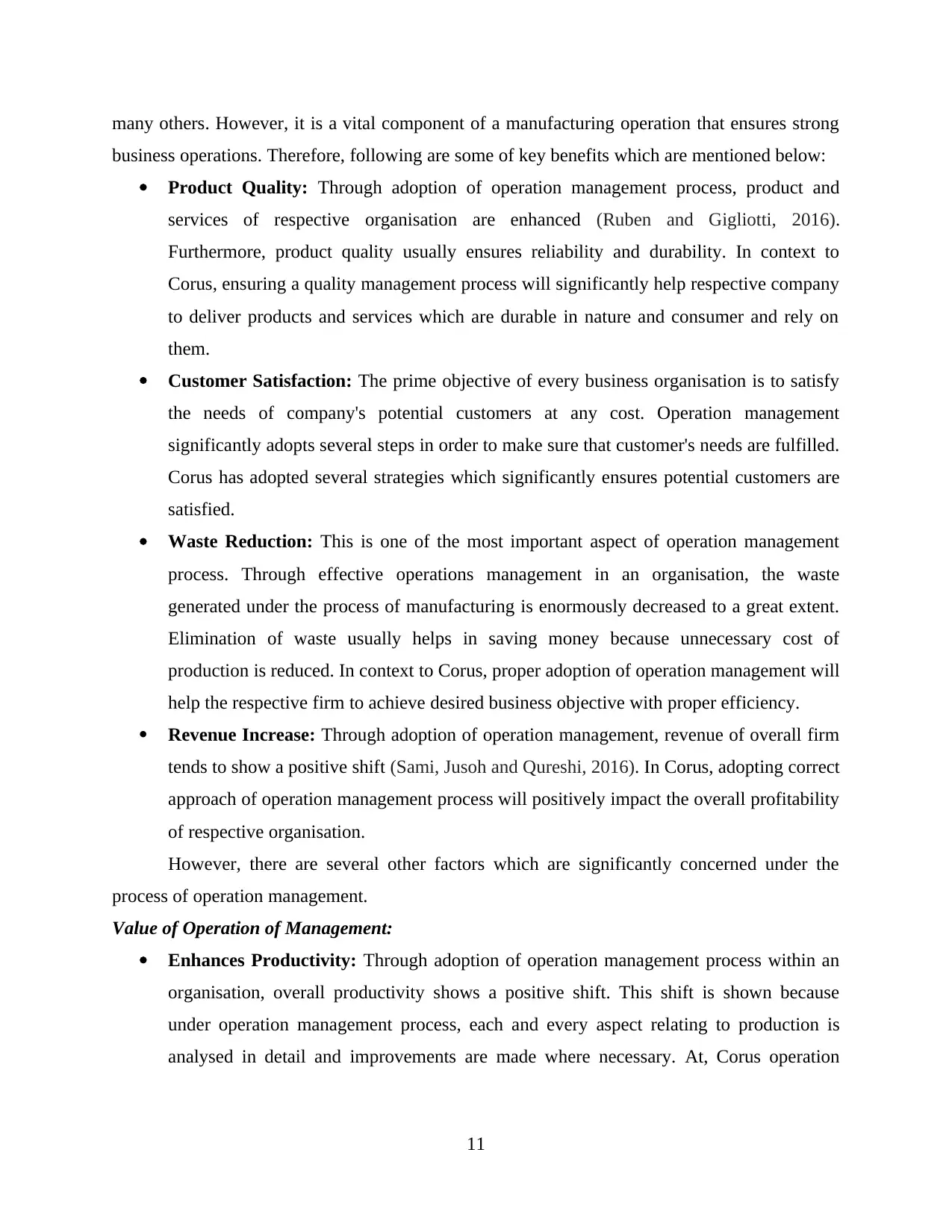
many others. However, it is a vital component of a manufacturing operation that ensures strong
business operations. Therefore, following are some of key benefits which are mentioned below:
Product Quality: Through adoption of operation management process, product and
services of respective organisation are enhanced (Ruben and Gigliotti, 2016).
Furthermore, product quality usually ensures reliability and durability. In context to
Corus, ensuring a quality management process will significantly help respective company
to deliver products and services which are durable in nature and consumer and rely on
them.
Customer Satisfaction: The prime objective of every business organisation is to satisfy
the needs of company's potential customers at any cost. Operation management
significantly adopts several steps in order to make sure that customer's needs are fulfilled.
Corus has adopted several strategies which significantly ensures potential customers are
satisfied.
Waste Reduction: This is one of the most important aspect of operation management
process. Through effective operations management in an organisation, the waste
generated under the process of manufacturing is enormously decreased to a great extent.
Elimination of waste usually helps in saving money because unnecessary cost of
production is reduced. In context to Corus, proper adoption of operation management will
help the respective firm to achieve desired business objective with proper efficiency.
Revenue Increase: Through adoption of operation management, revenue of overall firm
tends to show a positive shift (Sami, Jusoh and Qureshi, 2016). In Corus, adopting correct
approach of operation management process will positively impact the overall profitability
of respective organisation.
However, there are several other factors which are significantly concerned under the
process of operation management.
Value of Operation of Management:
Enhances Productivity: Through adoption of operation management process within an
organisation, overall productivity shows a positive shift. This shift is shown because
under operation management process, each and every aspect relating to production is
analysed in detail and improvements are made where necessary. At, Corus operation
11
business operations. Therefore, following are some of key benefits which are mentioned below:
Product Quality: Through adoption of operation management process, product and
services of respective organisation are enhanced (Ruben and Gigliotti, 2016).
Furthermore, product quality usually ensures reliability and durability. In context to
Corus, ensuring a quality management process will significantly help respective company
to deliver products and services which are durable in nature and consumer and rely on
them.
Customer Satisfaction: The prime objective of every business organisation is to satisfy
the needs of company's potential customers at any cost. Operation management
significantly adopts several steps in order to make sure that customer's needs are fulfilled.
Corus has adopted several strategies which significantly ensures potential customers are
satisfied.
Waste Reduction: This is one of the most important aspect of operation management
process. Through effective operations management in an organisation, the waste
generated under the process of manufacturing is enormously decreased to a great extent.
Elimination of waste usually helps in saving money because unnecessary cost of
production is reduced. In context to Corus, proper adoption of operation management will
help the respective firm to achieve desired business objective with proper efficiency.
Revenue Increase: Through adoption of operation management, revenue of overall firm
tends to show a positive shift (Sami, Jusoh and Qureshi, 2016). In Corus, adopting correct
approach of operation management process will positively impact the overall profitability
of respective organisation.
However, there are several other factors which are significantly concerned under the
process of operation management.
Value of Operation of Management:
Enhances Productivity: Through adoption of operation management process within an
organisation, overall productivity shows a positive shift. This shift is shown because
under operation management process, each and every aspect relating to production is
analysed in detail and improvements are made where necessary. At, Corus operation
11
Paraphrase This Document
Need a fresh take? Get an instant paraphrase of this document with our AI Paraphraser
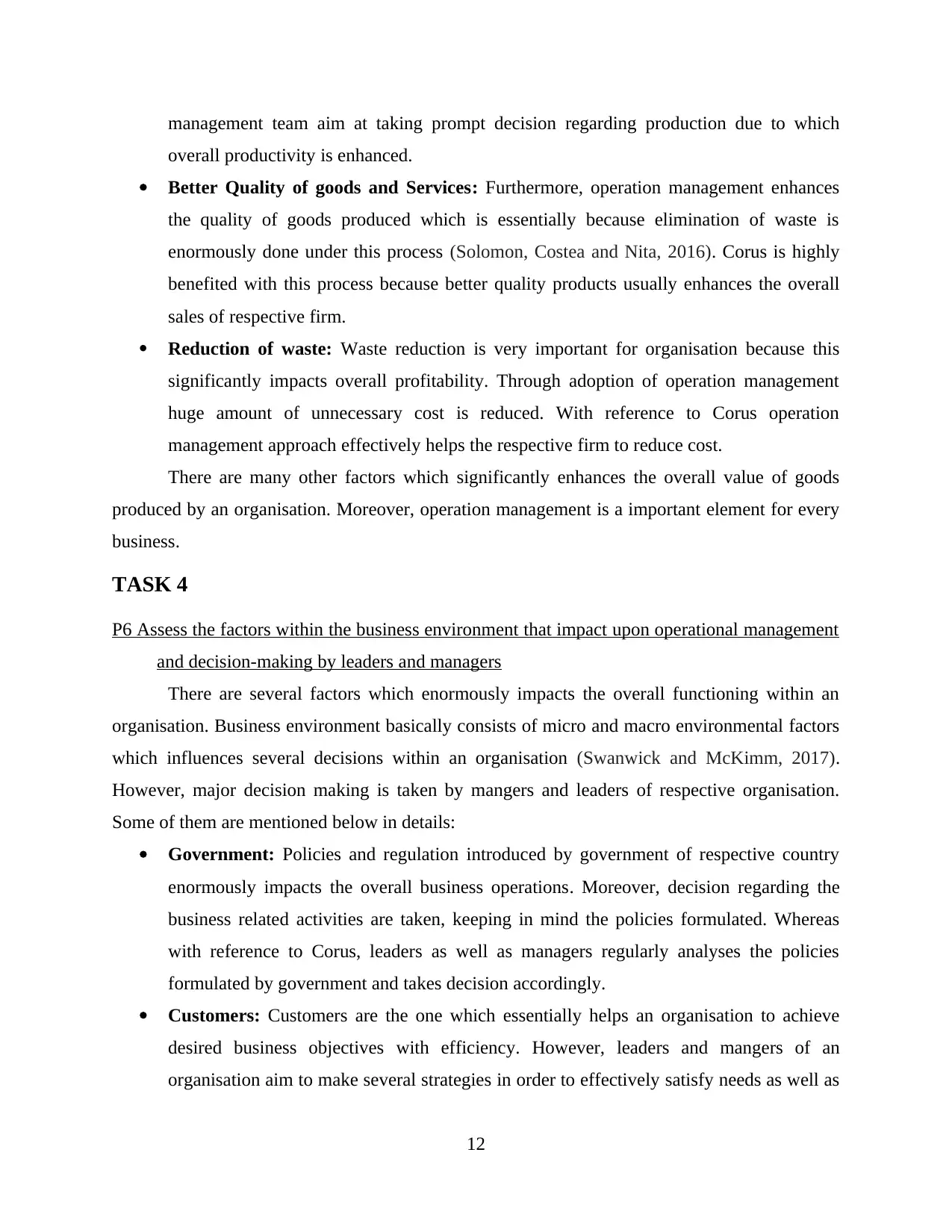
management team aim at taking prompt decision regarding production due to which
overall productivity is enhanced.
Better Quality of goods and Services: Furthermore, operation management enhances
the quality of goods produced which is essentially because elimination of waste is
enormously done under this process (Solomon, Costea and Nita, 2016). Corus is highly
benefited with this process because better quality products usually enhances the overall
sales of respective firm.
Reduction of waste: Waste reduction is very important for organisation because this
significantly impacts overall profitability. Through adoption of operation management
huge amount of unnecessary cost is reduced. With reference to Corus operation
management approach effectively helps the respective firm to reduce cost.
There are many other factors which significantly enhances the overall value of goods
produced by an organisation. Moreover, operation management is a important element for every
business.
TASK 4
P6 Assess the factors within the business environment that impact upon operational management
and decision-making by leaders and managers
There are several factors which enormously impacts the overall functioning within an
organisation. Business environment basically consists of micro and macro environmental factors
which influences several decisions within an organisation (Swanwick and McKimm, 2017).
However, major decision making is taken by mangers and leaders of respective organisation.
Some of them are mentioned below in details:
Government: Policies and regulation introduced by government of respective country
enormously impacts the overall business operations. Moreover, decision regarding the
business related activities are taken, keeping in mind the policies formulated. Whereas
with reference to Corus, leaders as well as managers regularly analyses the policies
formulated by government and takes decision accordingly.
Customers: Customers are the one which essentially helps an organisation to achieve
desired business objectives with efficiency. However, leaders and mangers of an
organisation aim to make several strategies in order to effectively satisfy needs as well as
12
overall productivity is enhanced.
Better Quality of goods and Services: Furthermore, operation management enhances
the quality of goods produced which is essentially because elimination of waste is
enormously done under this process (Solomon, Costea and Nita, 2016). Corus is highly
benefited with this process because better quality products usually enhances the overall
sales of respective firm.
Reduction of waste: Waste reduction is very important for organisation because this
significantly impacts overall profitability. Through adoption of operation management
huge amount of unnecessary cost is reduced. With reference to Corus operation
management approach effectively helps the respective firm to reduce cost.
There are many other factors which significantly enhances the overall value of goods
produced by an organisation. Moreover, operation management is a important element for every
business.
TASK 4
P6 Assess the factors within the business environment that impact upon operational management
and decision-making by leaders and managers
There are several factors which enormously impacts the overall functioning within an
organisation. Business environment basically consists of micro and macro environmental factors
which influences several decisions within an organisation (Swanwick and McKimm, 2017).
However, major decision making is taken by mangers and leaders of respective organisation.
Some of them are mentioned below in details:
Government: Policies and regulation introduced by government of respective country
enormously impacts the overall business operations. Moreover, decision regarding the
business related activities are taken, keeping in mind the policies formulated. Whereas
with reference to Corus, leaders as well as managers regularly analyses the policies
formulated by government and takes decision accordingly.
Customers: Customers are the one which essentially helps an organisation to achieve
desired business objectives with efficiency. However, leaders and mangers of an
organisation aim to make several strategies in order to effectively satisfy needs as well as
12
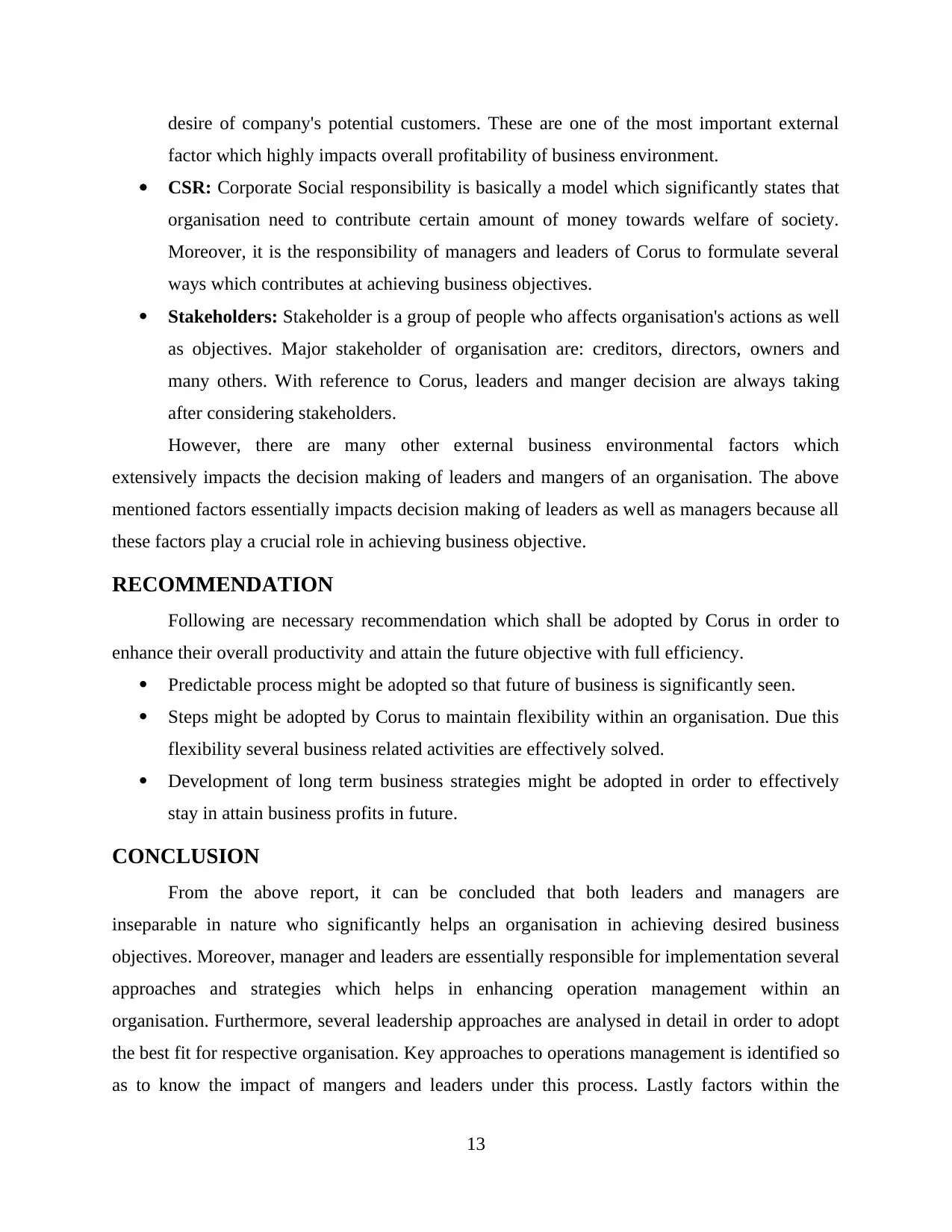
desire of company's potential customers. These are one of the most important external
factor which highly impacts overall profitability of business environment.
CSR: Corporate Social responsibility is basically a model which significantly states that
organisation need to contribute certain amount of money towards welfare of society.
Moreover, it is the responsibility of managers and leaders of Corus to formulate several
ways which contributes at achieving business objectives.
Stakeholders: Stakeholder is a group of people who affects organisation's actions as well
as objectives. Major stakeholder of organisation are: creditors, directors, owners and
many others. With reference to Corus, leaders and manger decision are always taking
after considering stakeholders.
However, there are many other external business environmental factors which
extensively impacts the decision making of leaders and mangers of an organisation. The above
mentioned factors essentially impacts decision making of leaders as well as managers because all
these factors play a crucial role in achieving business objective.
RECOMMENDATION
Following are necessary recommendation which shall be adopted by Corus in order to
enhance their overall productivity and attain the future objective with full efficiency.
Predictable process might be adopted so that future of business is significantly seen.
Steps might be adopted by Corus to maintain flexibility within an organisation. Due this
flexibility several business related activities are effectively solved.
Development of long term business strategies might be adopted in order to effectively
stay in attain business profits in future.
CONCLUSION
From the above report, it can be concluded that both leaders and managers are
inseparable in nature who significantly helps an organisation in achieving desired business
objectives. Moreover, manager and leaders are essentially responsible for implementation several
approaches and strategies which helps in enhancing operation management within an
organisation. Furthermore, several leadership approaches are analysed in detail in order to adopt
the best fit for respective organisation. Key approaches to operations management is identified so
as to know the impact of mangers and leaders under this process. Lastly factors within the
13
factor which highly impacts overall profitability of business environment.
CSR: Corporate Social responsibility is basically a model which significantly states that
organisation need to contribute certain amount of money towards welfare of society.
Moreover, it is the responsibility of managers and leaders of Corus to formulate several
ways which contributes at achieving business objectives.
Stakeholders: Stakeholder is a group of people who affects organisation's actions as well
as objectives. Major stakeholder of organisation are: creditors, directors, owners and
many others. With reference to Corus, leaders and manger decision are always taking
after considering stakeholders.
However, there are many other external business environmental factors which
extensively impacts the decision making of leaders and mangers of an organisation. The above
mentioned factors essentially impacts decision making of leaders as well as managers because all
these factors play a crucial role in achieving business objective.
RECOMMENDATION
Following are necessary recommendation which shall be adopted by Corus in order to
enhance their overall productivity and attain the future objective with full efficiency.
Predictable process might be adopted so that future of business is significantly seen.
Steps might be adopted by Corus to maintain flexibility within an organisation. Due this
flexibility several business related activities are effectively solved.
Development of long term business strategies might be adopted in order to effectively
stay in attain business profits in future.
CONCLUSION
From the above report, it can be concluded that both leaders and managers are
inseparable in nature who significantly helps an organisation in achieving desired business
objectives. Moreover, manager and leaders are essentially responsible for implementation several
approaches and strategies which helps in enhancing operation management within an
organisation. Furthermore, several leadership approaches are analysed in detail in order to adopt
the best fit for respective organisation. Key approaches to operations management is identified so
as to know the impact of mangers and leaders under this process. Lastly factors within the
13
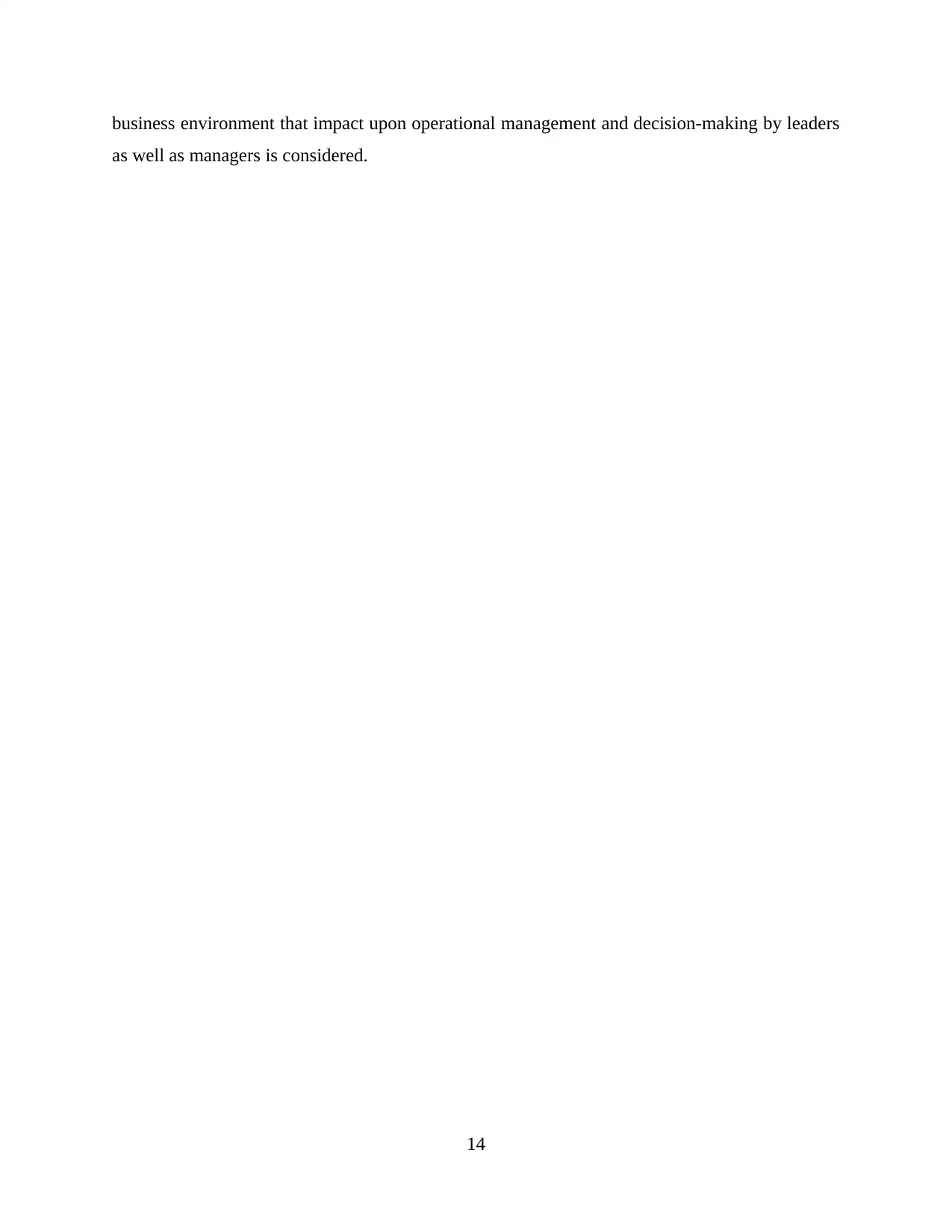
business environment that impact upon operational management and decision-making by leaders
as well as managers is considered.
14
as well as managers is considered.
14
Secure Best Marks with AI Grader
Need help grading? Try our AI Grader for instant feedback on your assignments.
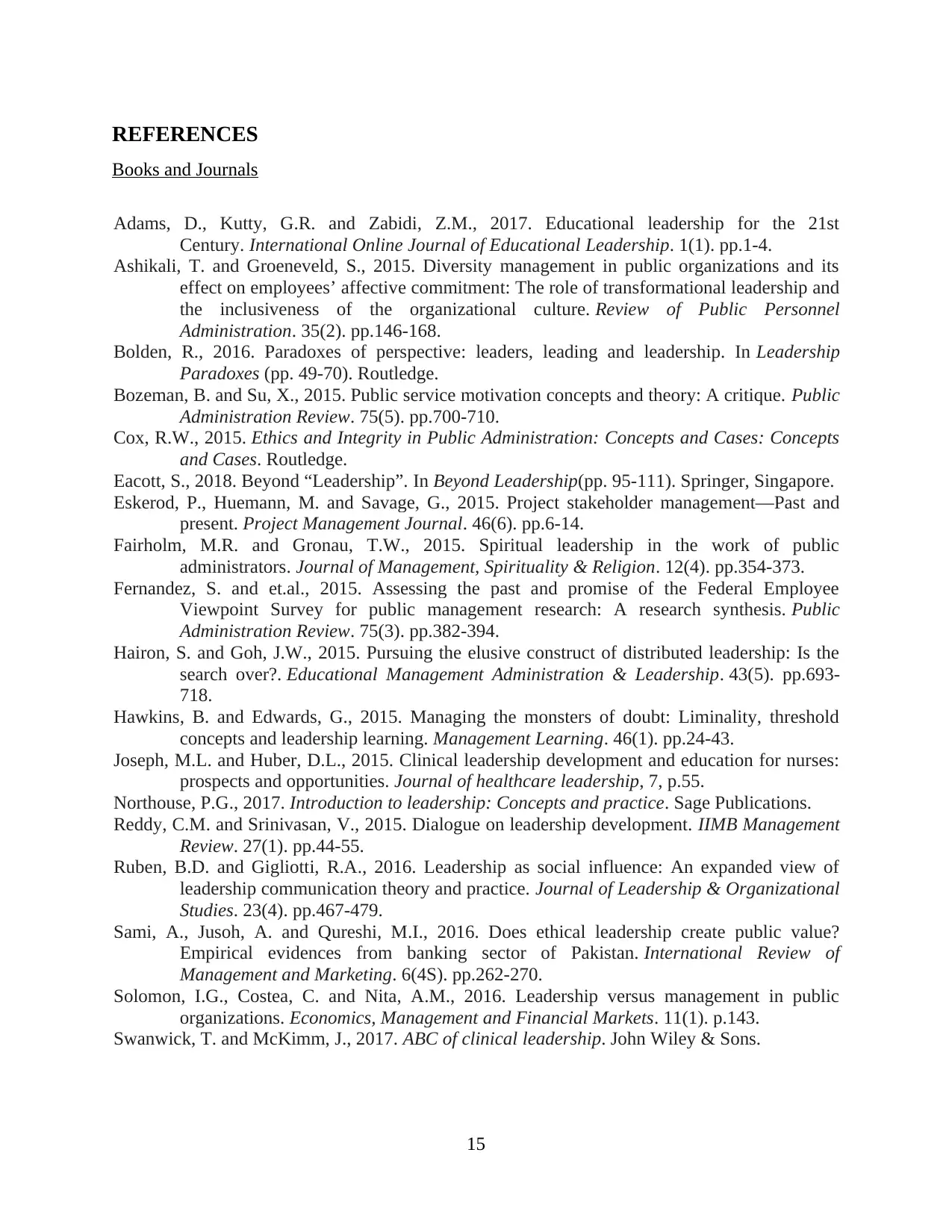
REFERENCES
Books and Journals
Adams, D., Kutty, G.R. and Zabidi, Z.M., 2017. Educational leadership for the 21st
Century. International Online Journal of Educational Leadership. 1(1). pp.1-4.
Ashikali, T. and Groeneveld, S., 2015. Diversity management in public organizations and its
effect on employees’ affective commitment: The role of transformational leadership and
the inclusiveness of the organizational culture. Review of Public Personnel
Administration. 35(2). pp.146-168.
Bolden, R., 2016. Paradoxes of perspective: leaders, leading and leadership. In Leadership
Paradoxes (pp. 49-70). Routledge.
Bozeman, B. and Su, X., 2015. Public service motivation concepts and theory: A critique. Public
Administration Review. 75(5). pp.700-710.
Cox, R.W., 2015. Ethics and Integrity in Public Administration: Concepts and Cases: Concepts
and Cases. Routledge.
Eacott, S., 2018. Beyond “Leadership”. In Beyond Leadership(pp. 95-111). Springer, Singapore.
Eskerod, P., Huemann, M. and Savage, G., 2015. Project stakeholder management—Past and
present. Project Management Journal. 46(6). pp.6-14.
Fairholm, M.R. and Gronau, T.W., 2015. Spiritual leadership in the work of public
administrators. Journal of Management, Spirituality & Religion. 12(4). pp.354-373.
Fernandez, S. and et.al., 2015. Assessing the past and promise of the Federal Employee
Viewpoint Survey for public management research: A research synthesis. Public
Administration Review. 75(3). pp.382-394.
Hairon, S. and Goh, J.W., 2015. Pursuing the elusive construct of distributed leadership: Is the
search over?. Educational Management Administration & Leadership. 43(5). pp.693-
718.
Hawkins, B. and Edwards, G., 2015. Managing the monsters of doubt: Liminality, threshold
concepts and leadership learning. Management Learning. 46(1). pp.24-43.
Joseph, M.L. and Huber, D.L., 2015. Clinical leadership development and education for nurses:
prospects and opportunities. Journal of healthcare leadership, 7, p.55.
Northouse, P.G., 2017. Introduction to leadership: Concepts and practice. Sage Publications.
Reddy, C.M. and Srinivasan, V., 2015. Dialogue on leadership development. IIMB Management
Review. 27(1). pp.44-55.
Ruben, B.D. and Gigliotti, R.A., 2016. Leadership as social influence: An expanded view of
leadership communication theory and practice. Journal of Leadership & Organizational
Studies. 23(4). pp.467-479.
Sami, A., Jusoh, A. and Qureshi, M.I., 2016. Does ethical leadership create public value?
Empirical evidences from banking sector of Pakistan. International Review of
Management and Marketing. 6(4S). pp.262-270.
Solomon, I.G., Costea, C. and Nita, A.M., 2016. Leadership versus management in public
organizations. Economics, Management and Financial Markets. 11(1). p.143.
Swanwick, T. and McKimm, J., 2017. ABC of clinical leadership. John Wiley & Sons.
15
Books and Journals
Adams, D., Kutty, G.R. and Zabidi, Z.M., 2017. Educational leadership for the 21st
Century. International Online Journal of Educational Leadership. 1(1). pp.1-4.
Ashikali, T. and Groeneveld, S., 2015. Diversity management in public organizations and its
effect on employees’ affective commitment: The role of transformational leadership and
the inclusiveness of the organizational culture. Review of Public Personnel
Administration. 35(2). pp.146-168.
Bolden, R., 2016. Paradoxes of perspective: leaders, leading and leadership. In Leadership
Paradoxes (pp. 49-70). Routledge.
Bozeman, B. and Su, X., 2015. Public service motivation concepts and theory: A critique. Public
Administration Review. 75(5). pp.700-710.
Cox, R.W., 2015. Ethics and Integrity in Public Administration: Concepts and Cases: Concepts
and Cases. Routledge.
Eacott, S., 2018. Beyond “Leadership”. In Beyond Leadership(pp. 95-111). Springer, Singapore.
Eskerod, P., Huemann, M. and Savage, G., 2015. Project stakeholder management—Past and
present. Project Management Journal. 46(6). pp.6-14.
Fairholm, M.R. and Gronau, T.W., 2015. Spiritual leadership in the work of public
administrators. Journal of Management, Spirituality & Religion. 12(4). pp.354-373.
Fernandez, S. and et.al., 2015. Assessing the past and promise of the Federal Employee
Viewpoint Survey for public management research: A research synthesis. Public
Administration Review. 75(3). pp.382-394.
Hairon, S. and Goh, J.W., 2015. Pursuing the elusive construct of distributed leadership: Is the
search over?. Educational Management Administration & Leadership. 43(5). pp.693-
718.
Hawkins, B. and Edwards, G., 2015. Managing the monsters of doubt: Liminality, threshold
concepts and leadership learning. Management Learning. 46(1). pp.24-43.
Joseph, M.L. and Huber, D.L., 2015. Clinical leadership development and education for nurses:
prospects and opportunities. Journal of healthcare leadership, 7, p.55.
Northouse, P.G., 2017. Introduction to leadership: Concepts and practice. Sage Publications.
Reddy, C.M. and Srinivasan, V., 2015. Dialogue on leadership development. IIMB Management
Review. 27(1). pp.44-55.
Ruben, B.D. and Gigliotti, R.A., 2016. Leadership as social influence: An expanded view of
leadership communication theory and practice. Journal of Leadership & Organizational
Studies. 23(4). pp.467-479.
Sami, A., Jusoh, A. and Qureshi, M.I., 2016. Does ethical leadership create public value?
Empirical evidences from banking sector of Pakistan. International Review of
Management and Marketing. 6(4S). pp.262-270.
Solomon, I.G., Costea, C. and Nita, A.M., 2016. Leadership versus management in public
organizations. Economics, Management and Financial Markets. 11(1). p.143.
Swanwick, T. and McKimm, J., 2017. ABC of clinical leadership. John Wiley & Sons.
15
1 out of 17
Related Documents
Your All-in-One AI-Powered Toolkit for Academic Success.
+13062052269
info@desklib.com
Available 24*7 on WhatsApp / Email
![[object Object]](/_next/static/media/star-bottom.7253800d.svg)
Unlock your academic potential
© 2024 | Zucol Services PVT LTD | All rights reserved.





